#Fung Tang
Text
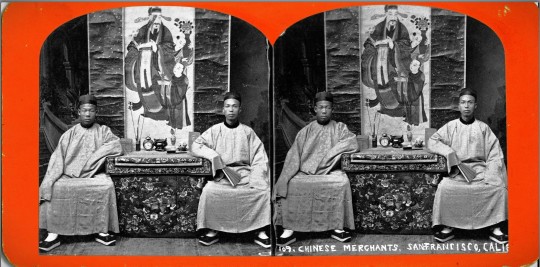
“109. Chinese Merchants, San Francisco, Calif.” c. 1890 – 1899? Stereograph by Nesemann Woods Gallery, Marysville CA (from the Wallace B. Chung and Madeline H. Chung Collection of the University of British Columbia Library).
Merchants of Old Chinatown
In the late 1840s and the 1850s, Chinese merchants and traders made their initial foray into California. By February 1849, the number of Chinese had increased to 54 and by January 1850, historians would count 787 men and two women in San Francisco. In December 1849, the Alta California newspaper reported that 300 Chinese convened a meeting at the Canton Restaurant on Jackson Street for the purpose of organizing the “Chinese residents of San Francisco” and engaging the services of lawyer Selim E. Woodsworth to “act in the capacity and adviser for them.”
In his book, Genthe’s Photographs of San Francisco’s Old Chinatown, historian John Tchen wrote about the vanguard of old San Francisco Chinatown’s merchant elite as follows:
“These pioneers hailed primarily from the Sanyi (Saam Yap) or Three Districts [三邑], as well as the Zhongshan area in the immediate vicinity of Canton. It's important to note that Nanhai (Namhoi) and Panyu (Punyu) stood out as the most prosperous districts within Guangdong Province. Their economic pursuits ran the gamut from cultivating fertile agricultural lands, breeding silkworms and fish, to crafting silk textiles, producing ceramics for both domestic and international markets, and engaging in various other commercial endeavors.
“What set apart the merchants and artisans from Sanyi and Zhongshan was their mastery of a more refined city dialect compared to their Siyi (Sei Yap) counterparts, who mainly consisted of poorer, rural communities. Remarkably, over 80 percent of Chinese immigrants in North America originated from the Siyi [四邑] region. A noteworthy portion of these Sanyi merchants belonged to the emerging class of compradores, individuals who facilitated business transactions on behalf of Western trading companies. These California-based Sanyi merchants thus brought prior experience in dealings with Western entrepreneurs, and California was seen as a promising arena to expand these lucrative connections.”
With the completion of the Transcontinental Railroad in May of 1869, the more sophisticated and adventurous members of San Francisco’s pioneer Chinese merchant community would begin exploring other cities in the United States in search of opportunity.
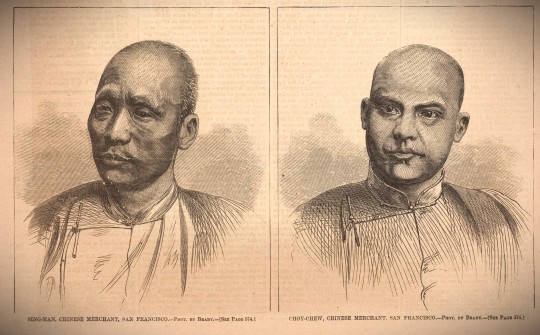
“Sing-Man, Chinese Merchant, San Francisco” and “Choy-Chew, Chinese Merchant, San Francisco,” Harper’s Weekly, September 4, 1869, wood engraving on paper. Artist unknown, artist after a photograph by Mathew Brady, 1869 (from the collection of the National Portrait Gallery).
For example, in the Harper’s Weekly article (Sept 4, 1869, page 574), the reporter identified merchant Choy Chew as a San Franciscan and a talented linguist of sufficient intellect and stature to be invited to give a speech at a European-American banquet. He reportedly visited Chicago with a fellow merchant, Sing Man, before traveling to New York where the pair were regarded as “representatives of Chinese industry and commerce.”
At the banquet in Chicago, Choy Chew delivered the following remarks:
”Eleven years ago I came from my home to seek my fortune in your great Republic. I landed on the golden shore of California, utterly ignorant of your language, unknown to any of your people, a stranger to your customs and laws, and in the minds of some an intruder — one of that race whose presence is deemed a positive injury to the public prosperity. But gentlemen, I found both kindness and justice. I found that above the prejudice that had been formed against us, that the hand of friendship was extended to the people of every nation, and that even Chinamen must live, be happy, successful and respected in ‘free America.’ I gathered knowledge in your public schools; I learned to speak as you do; and, gentlemen, I rejoice that it is so; that I have been able to cross this vast continent without the aid of an interpreter; that here in the heart of the United States I can speak to you in your own familiar speech, and tell you how much, how very much, I appreciate your hospitality; how grateful I feel for the privileges and advantages I have enjoyed in your glorious country; and how earnestly I hope that your example of enterprise, energy, vitality, and national generosity may be seen and understood, as I see and understand it, by our Government …
”We trust our visit, gentlemen, may be productive of good results to all of us; that the two great countries, East and West, China and America, may be found forever together in friendship, and that a Chinaman in America, or an American in China, may find like protection and like consideration in their search for happiness and wealth.“
-- from the Scientific American, new series, vol. 21, no. 9, p. 131 (August 28, 1869)
The founding in 1888 of the Merchants’ Exchange in old San Francisco Chinatown represented the logical culmination of several decades of robust business operations by the pioneer Chinese merchants in the city and beyond.
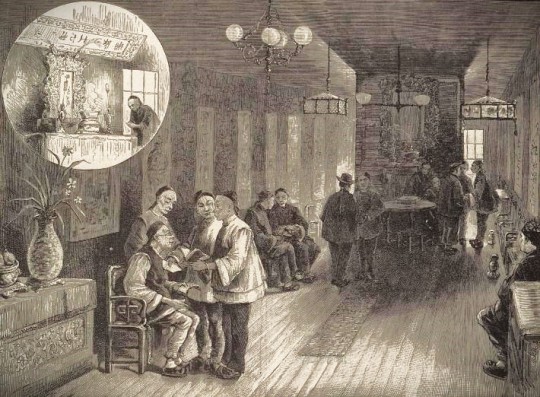
“Chinese Merchants’ Exchange, San Francisco.” Lithograph from Harper’s Weekly, Vol. 26, March 18, 1882 (from the collection of The Bancroft Library, University of California, Berkeley.
In his book, A Guide Book to San Francisco (published by The Bancroft Company in 1888), John S. Hittell described the Chinese Merchants Exchange as follows:
“At 739 Sacramento Street are the new rooms of the Chinese Merchants' Exchange. They are fitted up in the ordinary Chinese style, and though presenting no special attraction to the visitor, the business transacted there is of considerable importance. A Chinese merchant, contractor, or speculator never starts on any enterprise alone. He always has at least one partner, and in most cases several. He makes no secret of his transactions, but converses about them at the exchange, and often goes there in search of capital when his own means are insufficient. He sometimes applies to that institution to find him a capable man to manage a new business which he is about to start. If, as often happens, one be selected who is in debt to other members, they make arrangements which will not interfere with the new enterprise; and the debtor is not unfrequently released from his obligations.”
Fung Tang
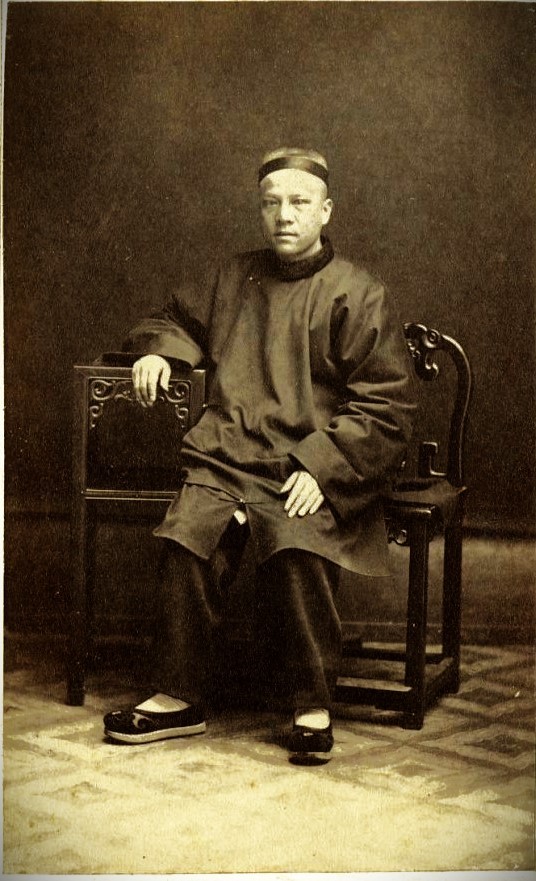
Fung Tang, c. 1870. Photo by Kai Suck (from the collection of the California Historical Society).
The address of the Merchants’ Exchange at 739 Sacramento Street was hardly surprising, as it shared the same building which had housed the mercantile house of a legendary merchant, Fung Tang. Historian York Lo, in his article for The Industrial History of Hong Kong Group website, described Fung as “a native of Jiujiang (Kow Kong) in the Nanhai county (南海九江) in Guangdong, Fung Tang followed his uncle Fung Yuen-sau (馮元秀) to California in 1857 at the age of 17 and worked at Tuck Chong & Co (德祥號辦莊), a trading business founded by his uncle and his fellow Nanhai native Kwan Chak-yuen (關澤元).” In the Langley San Francisco directory of 1868, the Tuck Chong & Co. is listed as “(Chinese) merchants” located on Chinatown’s first main street at 739 Sacramento Street.
“In his spare time,” York Lo writes, “he learned English from Reverend William Speer and became fluent in the language. With his linguistic skills, he became a bridge between the Chinese and the white community in San Francisco and even befriended Peter Burnett, the first Governor of California, who described Fung in his memoir as ’a cultivated man, well read in the history of the world, spoke four or five different languages fluently including English, and was a most agreeable gentleman, of easy and pleasing manners’.”
As such, Fung Tang must be considered as a logical client for the pioneer Chinatown photographer, Kai Suck. A professional studio portrait would have conferred respectability in the eyes of the non-Chinese businessmen and politicians with whom he interacted. In fact, Fung appears to have deployed the same portrait now reposing in the collection of the California Historical Society as part of his commercial advertising in Hong Kong.
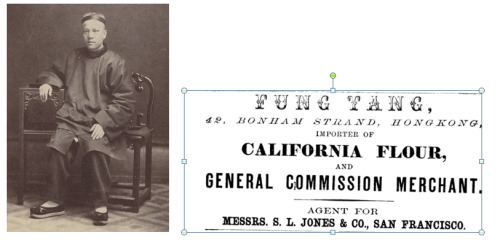
An advertisement for Fung Tang’s flour import business in the Sheung Wan district of Hong Kong.
For more details about Fung’s business exploits and his public service, including his election to the board of directors of the Tung Wah clinic (the original predecessor organization of the future Chinese Hospital), readers are encouraged to read York Lo’s piece here: https://industrialhistoryhk.org/fung-tang-the-firm-the-family-the-transpacific-metals-trade-and-tin-refinery/?fbclid=IwAR3DU6pEcaEw6w2uH1OZvFBFL8vg-Rl4keBS-VkbcttFuHKlx973g3ZjcY8
Tchen asserts that the influx of British and other Western imperialist powers into China’s major treaty ports transformed the status of merchants engaged with Western trading companies. Rather than operating on the margins of Qing-era society, the merchants gained unprecedented prestige and influence. Beyond China's borders, they experienced far more freedom to engage in trade and amass substantial profits without the worry of state-imposed restrictions. They rapidly acquired the necessary language skills and business acumen to navigate their newfound opportunities.
San Francisco’s early Chinese merchants swiftly grasped the English language and American business practices, excelling in American-style transactions, and developing strategies for fostering positive relations with the general San Francisco populace. The local press affectionately labeled them "China Boys." They made conscious efforts to participate in the celebrations of significant American holidays, further endearing themselves to the San Francisco community.
This approach significantly bolstered their rapport with the local population, as evidenced by the California Courier's glowing praise: “We have never seen a finer-looking body of men collected together in San Francisco. In fact, this portion of our population is a pattern for sobriety, order, and obedience to laws, not only to other foreign residents, but to Americans themselves," declared Cornelius B. S. Gibbs, a marine-insurance adjuster, in 1877. Gibbs emphasized the high esteem in which Chinese merchants were held among white business circles. “As men of business, I consider that the Chinese merchants are fully equal to our merchants. As men of integrity, I have never met a more honorable, high-minded, correct, and truthful set of men than the Chinese merchants of our city.”
Attempts to participate in mainstream society, however, were not always welcomed by lower-class elements of white society as evident in this news account about Fung Tang’s appearance in San Francisco’s California Theatre in September 1869:
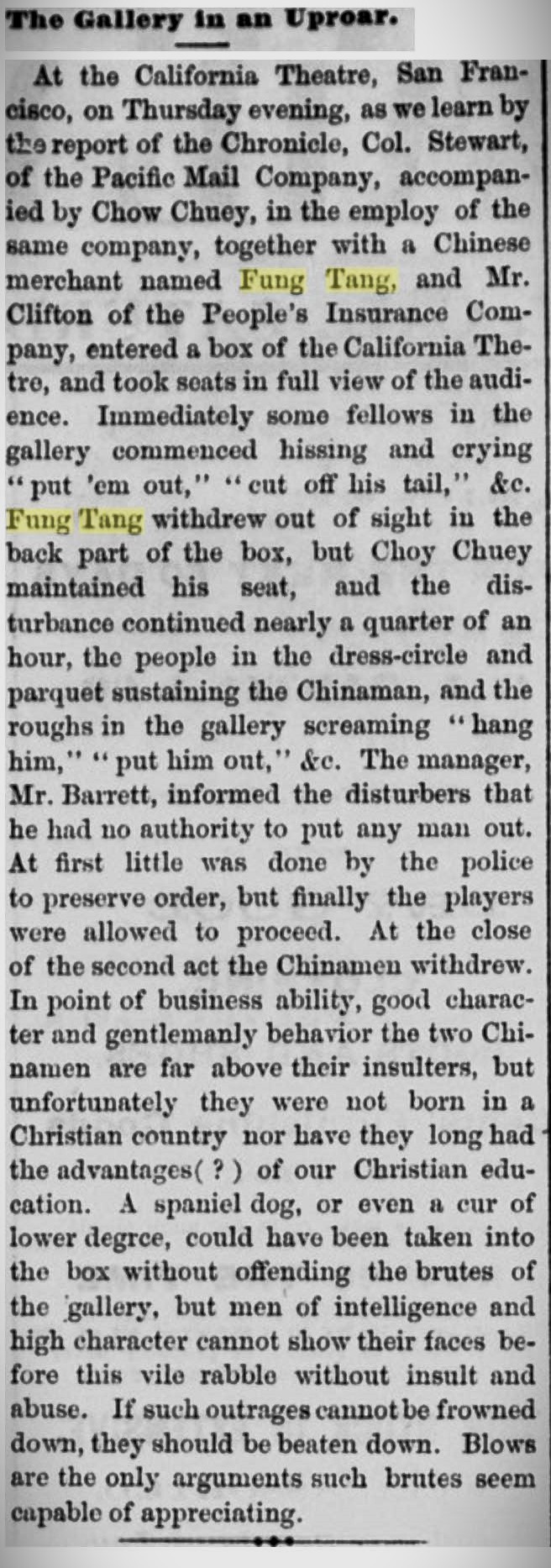
Clipping from the San Jose Mercury News, September 18, 1869 (vol. I no. 42)
Fung Tang’s transpacific success in San Francisco was hardly unique among the ranks of Chinatown’s early merchant class. He exemplified the business acumen of his fellow pioneering entrepreneurs and their establishment of transpacific trading posts in strategic locations.
Lai Chun-chuen and Chy Lung Co.
The story of the pioneer business of Chy Lung & Co. predates the history of San Francisco Chinatown itself, and its establishment spurred the rise of Chinatown’s first commercial strip, Sacramento Street (唐人街; canto: “Tohng Yahn Gaai”) or “Chinese Street.”
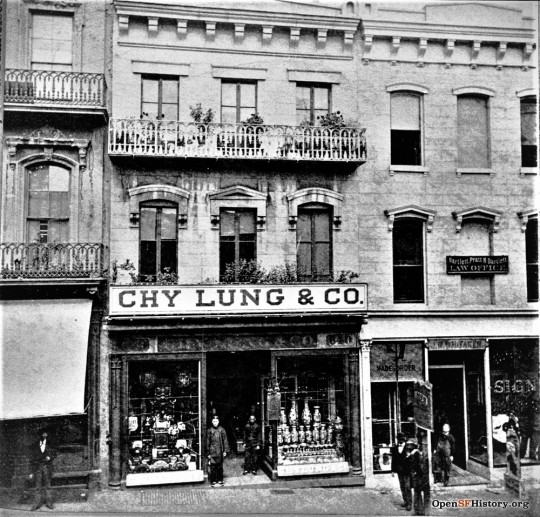
An enlargement of the stereograph taken by Carleton Watkins for the Thomas Houseworth & Co., and “[e]ntered according to Act of Congress, in the year 1866 by Lawrence & Houseworth, in the Clerk’s office of the District Court of the United States, for the Northern District of California.”
“Among the early Chinese settlers were merchants like Lai Chu[sic]-chuen,” the late historian Judy Yung wrote in her pictorial book, San Francisco’s Chinatown (published by the Chinese Historical Society of America). “Upon arrival in 1850, he opened Chinatown’s first Bazaar at 640 Sacramento Street, importing teas, opium, silk, lacquered goods, and Chinese groceries.”
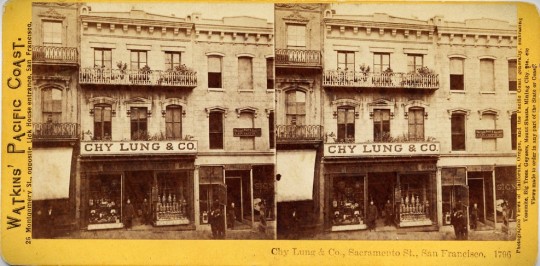
"Chy Lung & Co., Sacramento St., San Francisco. 1796" c. 1866. Photograph by Carleton Watkins for his Watkins' Pacific Coast stereograph series (from a private collection).
Chy Lung’s founder, Lai Chun-chuen (a.k.a. Chung Lock), came to San Francisco in 1850 from Nam Hoi county. According to UC professor Yong Chen, the business founded by Lai and, his partners Xie Mingli, Fang Ren, Sheng Wen, and Chen Nu, appear in the earliest business directories for San Francisco. A “Chyling, china mer, 188 Washington” appears in the Parker directory for 1852-1853. The Colville’s directory of 1856 lists a “Chy Lung (Chinese) mcht, Canton Silk and Shawl Store, 166 Wash’n,” and the business would remain on Washington Street (moving to 612 Washington St. by 1858) until 1863 when it relocated to 642 Sacramento Street. By 1865, the Chy Lung & Co. had either expanded or taken over the address of 640 Sacramento Street.
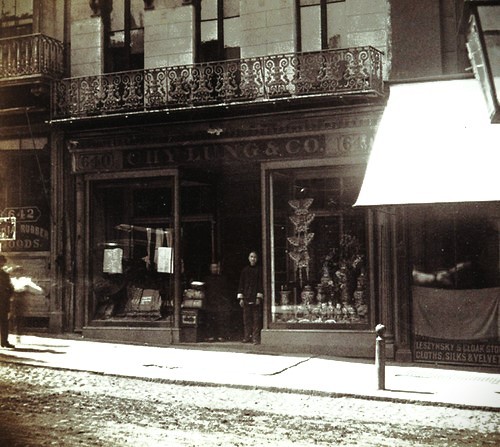
Portion of the stereograph “No. 391 Chinese Store. Chy Lung & Co.,” c. 1866. Published by Lawrence & Houseworth (from in the collections of the Society of California Pioneers, Wells Fargo Corporate Archives, and the Library of Congress).
“He imported Chinese prefabricated houses and cargoes of Chinese goods, teas, silk, lacquer and Porcelain wears, and even opium,” historian Phil Choy wrote. “The drug that made American merchants millionaires in the China trade now found its way to California for both the Chinese and American markets Chy Lung was one of only two Chinese businesses at the time that advertised in an American newspaper, the Daily Alta California.”

“No. 391 Chinese Store. Chy Lung & Co., Sacramento Street.” c. 1866. Published by Thomas Houseworth & Co. (from in the collection of the New York Public Library).
Lai Chun-chuen is remembered not only for his business acumen but also as the principal author of the objections to the anti-Chinese movement in California and plea for civil rights as published in the pamphlet, Remarks of the Chinese Merchants of San Francisco, upon Governor Bigler’s Message, and Some Common Objections (San Francisco: Whitton, Towne, 1855).
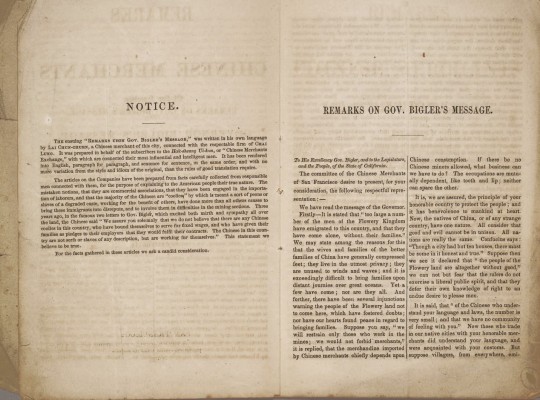
The preface to Remarks of the Chinese Merchants of San Francisco upon Governor Bigler’s Message, and Some Common Objections of 1855 (from the collection of the Bancroft Library). The second line of the first paragraph identifies Lai Chun-chuen as “a Chinese merchant of this city, connected with the respectable firm of CHAI LUNG.”
Chy Lung & Co. continued to play a leading role in the Chinese merchants exchange until Lai Chun-chuen’s death on August 30, 1868. The business remained a fixture of the Chinatown business community for the rest of the 19th century, and it adopted the new communications technology of the telephone, as shown by the Pacific Telephone directory for the Chinese Exchange in 1902.

The listing for Chy Lung & Co. as it appeared in the Wells Fargo directories of Chinese business for 1878 and 1882.
The Chy Lung & Co. business, and others established by Chinatown's merchants, soon comprised a source of both tangible and symbolic power within the rapidly growing Chinese community in the American West. As the Chinese immigrant population swelled, businesses catering to their specific needs diversified and expanded. A hierarchical structure emerged, influenced by both economic factors and the district of origin. The wealthier Sanyi individuals typically presided over larger, commercially successful enterprises, including import-export firms. Those from the Nanhai District dominated the men's clothing and tailoring sector, as well as butcher shops. The neighboring Shunde District populace exercised control over overalls and workers' clothing factories.
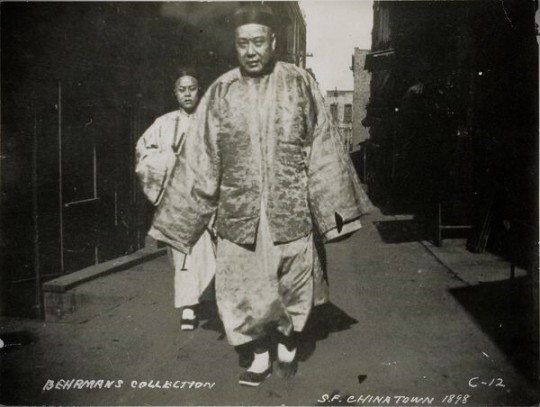
“S.F. Chinatown 1898 C12”. Photographer unknown (from the Martin Behrman Collection of the San Francisco Public Library). A well-attired merchant and possibly his son walk south on Spofford Alley from Washington to Clay Street.
Meanwhile, Chinese hailing from the Zhongshan District, which represented the second-largest Chinese population in California, were prominent in the fish and fruit orchard businesses, as well as in the production of women's garments, shirts, and underwear.
"Quan Quick Wah"
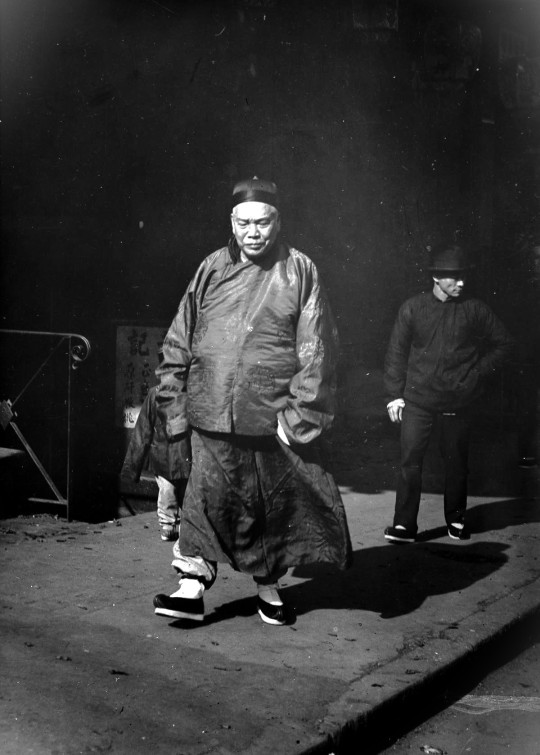
“Merchant and Bodyguard” c. 1896 – 1906. Photograph by Arnold Genthe (from the collection of the Library of Congress). A descendant of the large, confident man shown in traditional robes identifies him as San Francisco merchant “Quan Quick Wah.” Based on other photographs of this Chinatown location, the pair appears to be walking on the west side of Waverly Place toward its intersection with Clay Street. In his book about Genthe’s Chinatown photographs, historian Jack Tchen wrote about this imposing figure followed by a bodyguard as follows: “The powerfully built man dressed in traditional silk robes has been described as a tong leader. Whether he was a tong leader, a wealthy merchant, or both, his dress and carriage convey a strong presence. Tong leaders came to rival the power of wealthy merchants. The man following the merchant or tong leader is said to have been his bodyguard, protecting him from the attack of a rival tong. In the photograph the two are passing under ornate cloth lanterns that indicate a pawnshop business.”
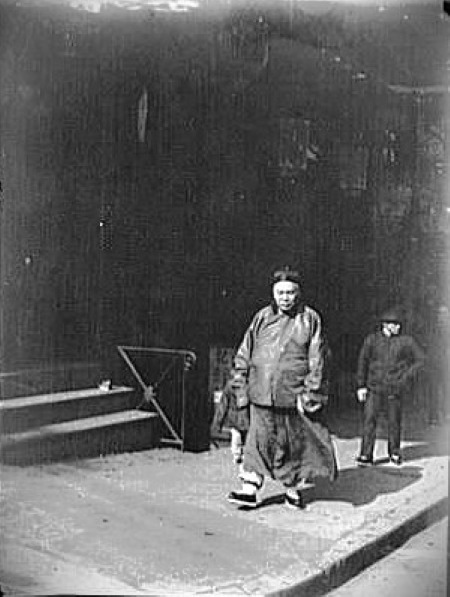
"Merchant and Bodyguard” c. 1896 – 1906. Photograph by Arnold Genthe (from the collection of the Library of Congress). This full photograph in the Library of Congress shows that Genthe’s image fortunately included a portion of the sign for the entrance to a basement restaurant. The signage (which appears in other photographs of this area), indicates that the merchant and bodyguard were photographed walking on the west side of Waverly Place (at about no. 23 and 25 Waverly) and toward the southwest corner of its intersection with Clay Street. Tchen’s guess that the background store frontage was a pawnshop is probably correct, as the “Qung Hing Art Co.” pawnshop occupied space at 25 Waverly during the 1890s. The headquarters of the merchant-controlled, Ning Yung district association was located at 23 Waverly.
Yee Ah-Tye
In old Chinatown, merchants’ personal use of bodyguards or alliances with fighting tongs were common. The organization and fragmentation of district and clan associations, along with sharp business competition, often placed lives, as well as livelihoods, at risk. For example, the Kong Chow association traced its origin to about 1853, when the influential community leader, Yee Ahtye (a.k.a. “George Athei”) persuaded members of his Yee clan of Sunning, which had remained in the Sze Yup Co. (after a number of clans split off to organize today’s dominant Ning Yung Association), to finally secede. The action by the Yee clan was joined by clans from Hoiping and Enping counties after a dispute over the presidency of the Sze Yup Co. in 1862. The resulting new association, the Hop Wo, soon challenged the merchant Ah-Tye for the custody of a piece of land on which Ah-Tye had allowed the Sze Yup Association to build a headquarters building. Yee eventually deeded the land to a new Kong Chow Association, which his fellow Sunwui merchants founded in 1866. The dispute over this property raised to such a level that Yee and his associates were compelled to organize a secret society, the Suey Sing Tong, to protect the asset and enforce his decision.
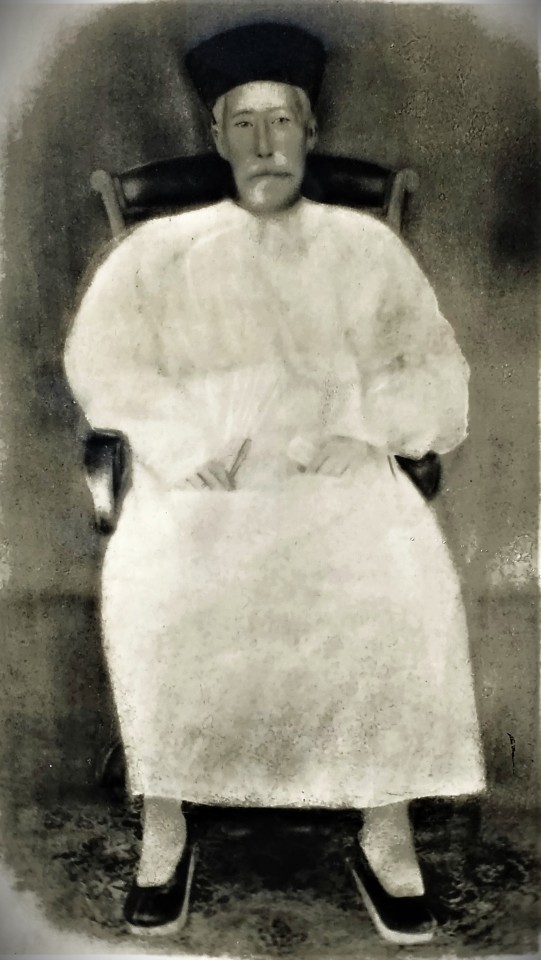
Portrait of Yee Ah-Tye (courtesy of the Chinese Six Companies). Yee was an elite merchant of Chinatown and was considered a co-founder of the Suey Sing Tong.
Born around 1829 in Guangdong province, Yee Ah-Tye had arrived in San Francisco just before the gold rush at around 20 years old. In spite of his humble beginnings, Yee had learned English in Hong Kong and swiftly ascended to a position of authority within the influential Sze Yup [pinyin: "Siyi"] Association. The Sze Yup Association, along with similar Chinese district associations, played a crucial role in assisting newly arrived Chinese immigrants during the 19th century. The organizations provided accommodation and job opportunities.
Aside from his many business accomplishments, Yee famously cross paths with the legendary, San Francisco madam Ah Toy. The conflict arose when Ah Toy accused Yee of demanding a tax from her prostitutes on Dupont Street. Despite her origins in China, Ah Toy had by then lived in America for three years and become familiar with its legal system. She boldly threatened to take legal action against him, a move she would not have dared to undertake in China.
The August 1852 report in the Daily Alta California newspaper highlighted Ah Toy's shrewdness, emphasizing her knowledge of living in America and her ability to navigate the legal system. She resided close to the police station, fully aware of where to seek protection, having faced legal proceedings herself numerous times. The reporter gleefully suggested that Yee use caution about overstepping his authority, warning that he might lose his dignity and end up in custody.
A year later, Yee faced legal trouble himself, being arrested for assault and grand larceny. The San Francisco Herald alleged Yee “inflicted severe corporeal punishment upon many of his more humble countrymen … cutting off their ears, flogging them and keeping them chained for hours together.”
After moving to Sacramento in 1854, Yee also relocated his business activities in 1860 to La Porte, California, where hydraulic and drift mining operations for gold occurred. Yee acquired a partnership in a store called Hop Sing & Company which supplied merchandise and Chinese contract laborers. By 1866, it was the richest Chinese store in that town, with a value of $1,500 (about $36,000 in 2005 dollars).
According to one of his descendants, Lani Ah Tye Farkas, the pioneer Yee Ah Tye reportedly lived thirty-four years in La Porte as a successful merchant, running the Hop Sing and Company store and representing the Chinese community in the area. He had three wives and four children, three of whom were girls. Unlike most other Chinese fathers at the time, he invested in the education of his daughters – he even bought a piano for his youngest daughter, Bessie, who became an accomplished pianist. As a leader in the Hop Sing Association, he founded a small hospital to serve the elderly Chinese men of La Porte.
“The temple ruins at San Francisco's Lincoln Municipal Park Golf Course was once part of the Lone Mountain Cemetery, a gift of Ah Tye,” Lani Ah Tye Farkas wrote in 2000. “Other glimpses of his life in America can be seen in deeds, mining claims, tax assessments, newspaper articles, and land that he once owned. Yee Ah Tye's legacy, however, is in his descendants. Many Chinese with common last names like Chan, Lee, and Wong may have no relationship with one another. However, the descendants of Yee Ah Tye have borne his unique last name through six generations, in the words of the Yee family genealogy, ‘spreading like melon vines, increasing continuously’” Yee died in 1896. (see: https://scholarworks.calstate.edu/downloads/pc289j76z)
Contract Labor
At the lower end of the business hierarchy, the Siyi or Four District residents comprised the largest and least affluent group of Chinese immigrants. They typically occupied occupations such as laundries, small retail shops, and restaurants and the bulk of the laborers in the contract labor system.
In the period preceding the Civil War, there was a concerted effort by certain individuals to introduce contract laborers into the United States. A letter penned by C. V. Gillespie to Thomas Larkin on March 6, 1848, sheds light on this initiative. Gillespie expressed a keen interest in the idea of bringing Chinese emigrants to the country, suggesting that a variety of skilled workers and laborers could be sourced:
"One of my favorite subjects or projects is to introduce Chinese emigrants into this country,… Any number of mechanics, agriculturists and servants can be obtained. They would be willing to sell their services for a certain period to pay their passage across the Pacific…."
The practice of importing contract laborers to the United States began in the late 1840s and continued through the 1850s. However, enforcing labor contracts proved to be a challenging endeavor on American soil. A case in point involved an Englishman who, upon bringing fifteen Chinese laborers to the country bound by a two-year contract, found that they immediately reneged on their agreement upon arrival. Authorities, at the time, were reluctant to intervene in such disputes.
In 1852, Senator George B. Tingley introduced a bill in the California State legislature aimed at legalizing and facilitating the enforcement of contracts allowing Chinese laborers to sell their services to employers for periods of up to ten years at fixed wages. This proposal, however, faced significant public backlash and was ultimately defeated after a heated debate. The subsequent year saw members of Chinese companies admitting that they had initially imported workers during the early years of the Gold Rush. Yet, due to unprofitability and difficulties in enforcing labor contracts, they abandoned this practice.
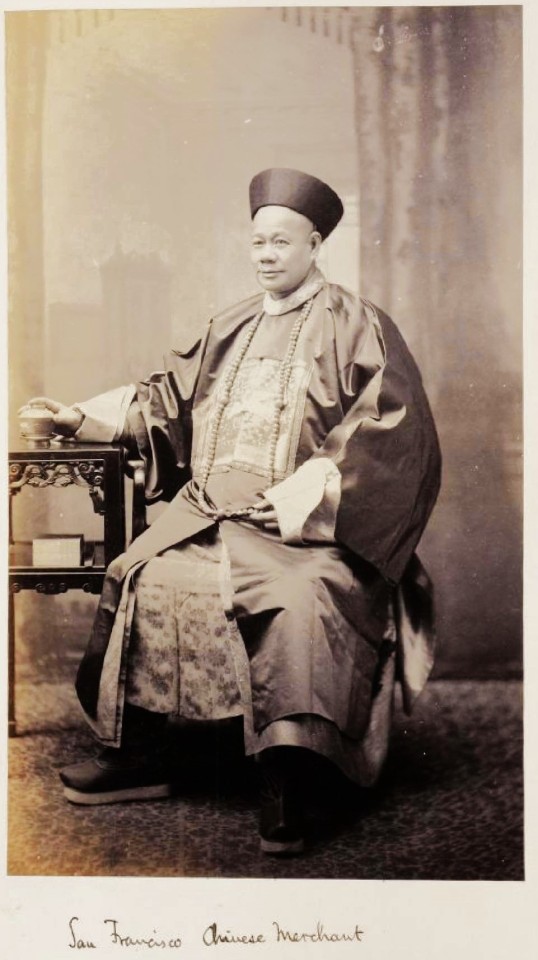
“San Francisco Chinese Merchant” no date. Photographer unknown, possibly by Ann Ting Gock (from a private collection). This rare and unusual image suggests that the individual might not have been a mere merchant at all, but a member of the Chinese consular staff. He is seen wearing his 清代官帽 (canto: "ching dai gwun moe") or official's headwear. The Qing official headwear or Qingdai guanmao (Chinese: 清代官帽; pinyin: qīngdài guānmào; lit. 'Qing dynasty official hat'), also referred to as the “Mandarin hat” in English, is a generic term which refers to the types of guanmao (Chinese: 官帽; pinyin: guānmào; lit. 'official hat'), a headgear, worn by the officials of the Qing dynasty in China. The merchant is attired in a "changshan" or "changpao" or long robe. The robe worn in the photo was derived from the Qing dynasty-period "qizhuang" (the traditional dress of the Manchu people). Changshan were, and are, traditionally worn for formal pictures, weddings, and other formal Chinese events.
Credit-ticket System
Beyond the initial years, it became widely acknowledged that Chinese immigrants arrived in the United States voluntarily, free from any servile contracts or duress. Many emigrants either financed their own passage or received assistance from relatives and friends already residing in California. The prevailing method for the majority of Chinese immigrants during the 19th century was the credit-ticket system. Under this system, an emigrant would receive financial support for their passage in a Chinese port. Upon reaching their destination, the emigrant was expected to repay this debt using their future earnings. It is important to note that this system differed from the contract labor arrangement, where laborers were bound to serve for a specified duration.
The precise origins of the credit-ticket system remain uncertain. However, merchant brokers in Hong Kong were established to provide advanced passage funds, approximately forty dollars, to the emigrants. Corresponding entities in the United States were responsible for collecting these debts and aiding the newly arrived immigrants in finding employment.
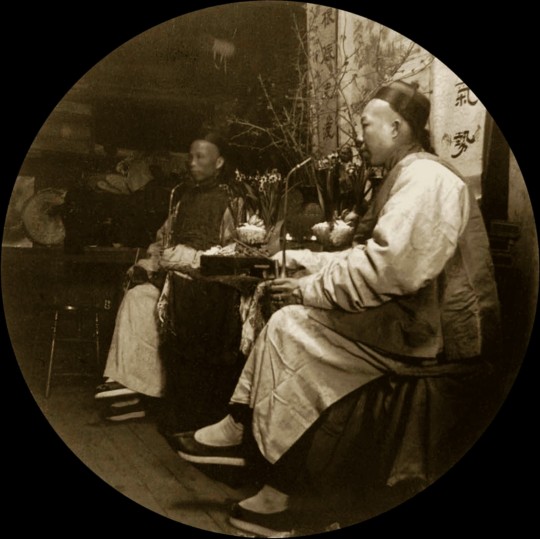
Two merchants with pipes. No date, photographer unknown (from a private collection).
The stores and offices that the merchants of Chinatown had opened starting in the mid-19th century became the basis of real and symbolic power in the growing regional community of Chinese living in the American West. That power, including the ability to mobilize for social change within the narrow role afforded Chinese in the society, manifested itself in the family and district associations headed by local merchants.
“The merchant class has traditionally been the one sector of Chinese society able to foster unity and bring about social change,” wrote historian Thomas W. Chinn about the role of the merchant class in San Francisco Chinatown (and beyond). “The merchant-directors of the Chinese Consolidated Benevolent Association must be well-established businessmen in the local community as well as outstanding members of their own family associations. They have already played a leading role in their own social circles before becoming merchant-directors, and they enjoy a great deal of respect. . . Thus the friendly corner grocer may simultaneously be the president of his family association and his district association as well as a merchant-director.”
Lew Kan
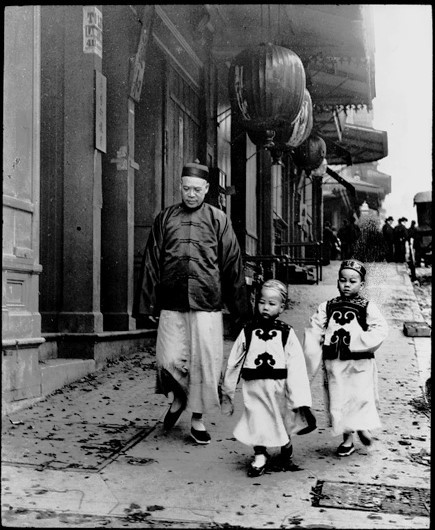
“Children of High Class” c. 1900. Photograph by Arnold Genthe (from the Genthe photograph collection, Library of Congress, Prints and Photographs Division). Merchant Lew Kan (a.k.a. Lee Kan) walking with his two sons, Lew Bing You (center) and Lew Bing Yuen (right). According to historian Jack Tchen, “Lew Kan was a labor manager of Chinese working in the Alaskan canneries. He also operated a store called Fook On Lung at 714 Sacramento Street between Kearney [sic] and Dupont. Mr. Lew was known for his great height, being over six feet tall, and his great wealth. The boys are wearing very formal clothing made of satin with a black velvet overlay. The double mushroom designs on the boys’ tunics are symbolic of the scepter of Buddha and long life.” The photograph appears to have found the trio walking down the south side of Sacramento Street below Dupont Street.
By the time photographer Arnold Genthe had photographed merchant Lew Kan and his two sons on Sacramento Street (as well as two other earlier photos of their four sisters in Portsmouth Square), Lew had already attained legendary status as one of Chinatown’s leading merchants. Born in 1851, Lew entered the US in 1866.
Author Roland Hui (in his biography of pioneer Chinese American industrialist Lew Hing), wrote about Lew Kan and his dry goods business called Lun Sing & Co. at 706 Sacramento Street as follows:
“He started Lun Sing, one of the oldest businesses in Chinatown, around 1867, a year after he immigrated to the U.S. In 1896, the business gained notoriety by harboring a young Chinese revolutionary named Sun Yat-sen during his first visit to the continental United States. Sun advocated overthrowing the Qing monarchy and establishing a Chinese republic. His ideas were too radical for the politically uninitiated Chinese community. Kang Youwei, the architect of the ill-fated “Hundred Day Reform” in China in 1898, favored establishing a constitutional monarchy around Emperor Guangxu. Forced into exile after the power-hungry Empress Dowager crushed his reform, Kang launched the Chinese Empire Reform Association, also known as Baohuanghui (Save the Emperor Society), the following year in Victoria, Canada. Baohuanghui quickly gained widespread support among overseas Chinese since the idea of having an emperor at the top of the social order who ruled with the Mandate of Heaven had been ingrained in the Chinese psyche for thousands of years. The San Francisco Baohuanghui chapter was founded in 1899 at 146 Waverly Place. Lew Kan supported Kang’s political agenda despite having met Sun several years earlier, and in 1901 became the president of the San Francisco chapter of Baohuanghui. Many scholars observed that Baohuanghui was the first organization that evoked the patriotic sentiments of overseas Chinese. And when Liang Qichao, Kang's most famous student, stopped over in San Francisco during his 1903 America tour, thousands of Chinese flocked to listen to his speeches. As the man who organized these community-wide activities, Lew Kan's stature and influence in San Francisco Chinatown must have been substantial. In addition, he was one of the wealthiest Chinese merchants, reportedly owning several general merchandise stores with an estimated net worth of $2 million. That was an astronomical sum in those days. In addition, he was a director of the Kong Chow Company, a district association representing Xinhui."
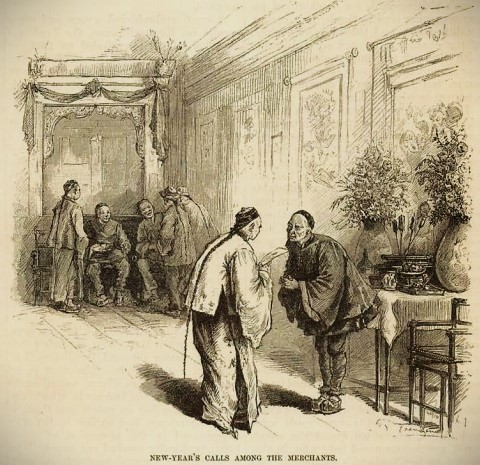
New-Year's Calls Among the Merchants" illustration from the article "The Sixth Year of Qwong See," published in Harper's Magazine, December 1880. The image may have captured merchants greeting each other at the Chinese Merchants Exchange on Sacramento Street perhaps on or about the fourth day of the Chinese New Year holiday period when business traditionally returns to normal.
Decline of Merchant Influence
The organizational expression of Chinatown’s merchant elite, the Chinese Six Companies, wielded considerable authority within San Francisco and beyond. The Six Companies and its constituent district associations comprised the quasi-government of Chinese America, offering social services, mediating disputes, and representing the community's interests to external forces. With the enactment of the Chinese Exclusion Act in May 1882, their grip on power began to weaken.
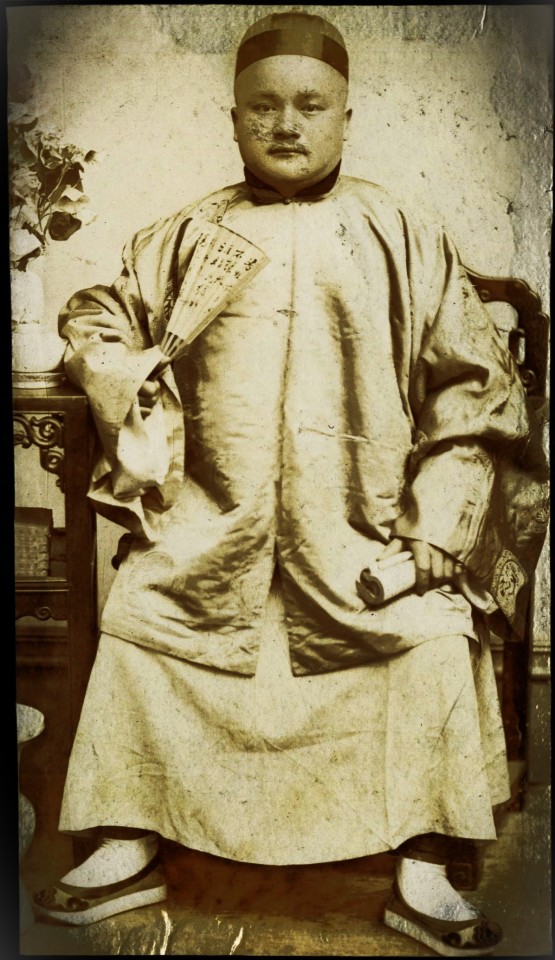
Portrait of a merchant with fan and scroll. No date, photograph possibly by Shew’s studio (based on the detail of the end-table), from the collection of the Stanford Libraries.
The decline of the Six Companies’ influence can be attributed to various reasons. One significant factor was their inability to adapt swiftly to the evolving socio-economic landscape within Chinatown. As the community faced new challenges, including the punitive extension of Chinese exclusion with the Geary Act of 1892, the Six Companies struggled to effectively navigate these changes, leading to a loss of faith among the populace in their ability to address emerging issues.
The Geary Act of 1892 extended and strengthened the Chinese Exclusion Act of 1882, requiring most Chinese Americans – native and foreign-born -- to carry an internal passport in the form of certificates of identity or face arrest and deportation. It intensified discriminatory measures against the Chinese community, fostering widespread discontent and resistance.
In response, the Six Companies initiated a national boycott against the Geary Act. The boycott aimed to unify Chinese immigrants and their supporters across the United States, urging them to refuse compliance with the law as a form of protest. It gained substantial momentum, with significant participation from Chinese communities in various cities, voicing opposition to the Act's discriminatory provisions.
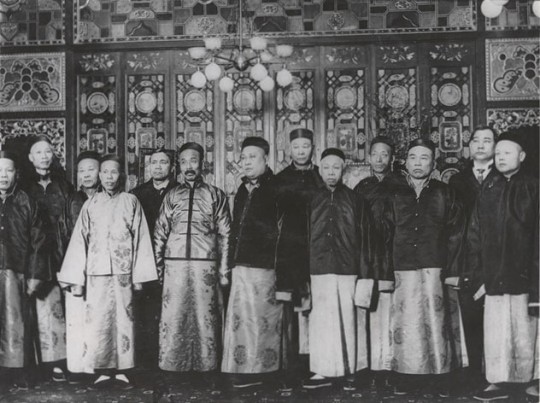
The board of directors of the Chinese Six Companies, no date. Photographer unknown (from the collection of the Bancroft Library). Based on the screen panels in the background (which remain in the Six Companies’ meeting hall at 843 Stockton Street in San Francisco), the photo appears to have been taken after 1906.
Despite its initial vigor, several factors led to the ultimate collapse of the national boycott against the Geary Act. First, the federal government intensified its efforts to enforce the Geary Act. Authorities conducted widespread raids and inspections, threatening deportation and imposing harsh penalties on those failing to comply. The fear of reprisals and the potential disruption to livelihoods coerced many Chinese immigrants into reluctantly acquiescing to the Act's demands.
Second, the broader American society exhibited little sympathy or support for the Chinese community’s plight. The prevailing anti-Chinese sentiment in the country and the lack of significant political backing from other institutions diminished the effectiveness of the boycott. Without widespread solidarity, the Chinese American community struggled to sustain its resistance.
Finally, the decision by the US Supreme Court in Fong Yue Ting v. United States, 149 U.S. 698 (1893), dealt a major legal setback to Geary Act resistance and undermined the credibility of the Six Companies. The decision validated the Geary Act and created an environment of fear within the Chinese American community. The inability to overturn the Geary Act by legal means diminished trust in the Six Companies’ capacity to protect the community's interests.

Photograph of a merchant from Chinese Business Partnership Case File for Quong Lee Company, c. 1896. Photographer unknown (from the files of the Department of Justice, Immigration and Naturalization Service, San Francisco District Office). The immigration investigative case file indicates that the individual in this photo was certified as a business partner and a "merchant" who was “able to travel to and from the U.S. as a ‘Chinese subject of exempt class’ under the ‘Chinese Exclusion Acts’ (1882-1943).” The Quong Lee & Co. (a.k.a. Quong Lee, Quong Lee Sing) operated what business directories from 1875 to 1905 variously described as a “tailor,” “general merchandise,” “clothing,” and “dry goods” business continuously at 828 Dupont Street. By the time this merchant sat for his photo in 1896, the national boycott led by Chinese merchant organizations against the Geary Act of 1892 had collapsed, and studio portraits such as this became an essential pieces of evidence to support applications for the coveted merchant exemption from the extended Exclusion Act.
This heightened sense of vulnerability played into the hands of tongs, which, capitalized on the weakened merchant community. Amidst the faltering influence of the Six Companies, tongs emerged as influential entities that would come to dominate Chinatown’s socio-political structure and shape mainstream society’s perceptions of the Chinese community for the next three decades.
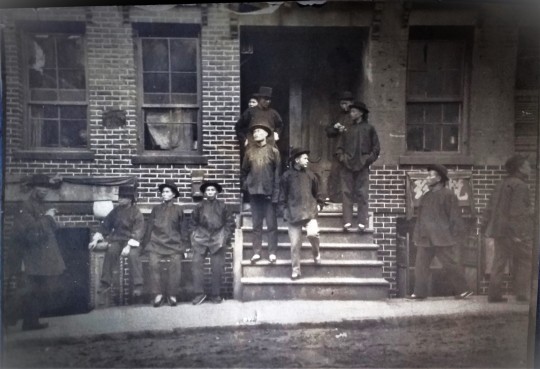
“High-binders Retreat” no date. Photograph by Goldsmith Brothers (from the Cooper Chow Collection of the Chinese Historical Society of America). Tong members at ease in front of their fraternal order's headquarters.
Tongs, in contrast to the Six Companies' diplomatic approach, adopted a more assertive stance in responding to discrimination and persecution faced by the Chinese community. Their readiness to protect their members (which also included merchants), and defy external pressures resonated with many disillusioned residents.
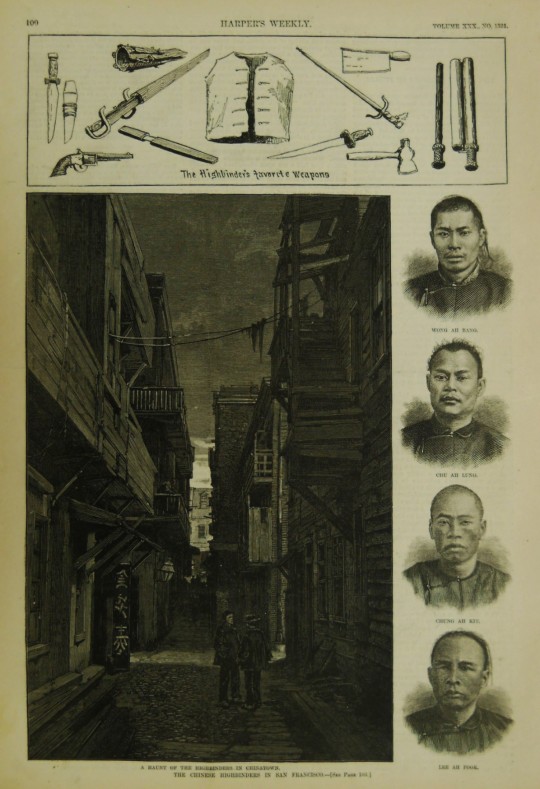
“A Haunt of the Highbinders in Chinatown.” Harpers Weekly, February 13, 1886 (from the collection of the Bancroft Library).
Moreover, the tongs during this period had begun to diversify their activities beyond traditional, illicitl sources of income such as prostitution, gambling, and drug distribution. Tongs began engaging in both legitimate businesses, including labor contracting for the Alaskan canneries. This diversification allowed them to accumulate resources, expanding their sphere of influence within Chinatown and beyond as alternative community governance structures, while still reserving often violent means to protect their interests.
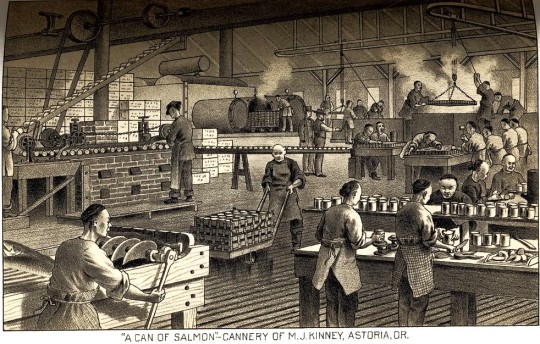
Chinese salmon cannery works in Astoria, Oregon, c. mid-1880s. Drawing from West Shore, June 1887, from the Special Collections, University of Washington). The early 20th century would be marked by violent struggles between tongs such as the Suey Sing and Bing Kung for control over the labor contracting business for the canneries.
The ascendancy of tongs at the turn of the century coincided with the republican movement in China. Historian Phil Choy wrote that the Chee Kung Tong, the original triad society, had been evolving in response to revolutionary movements in mainland China:
“Chee Kung Tong returned to its lofty political ideologies in 1900 when both Kang Yu-wei’s Reform Party and Sun Yat-sen’s Revolutionary Party sought its assistance. Originally the Chee Kung Tong supported Kang Yu-wei, but as Dr. Sun’s ideology gained popularity, the Chee Kung Tong, switched allegiance. When in 1904 immigration officials did not allow entry to Sun, the leader of the Chee Kung Tong, Wong Sam Ark, and the Tong’s attorney Oliver Stidger, along with Reverend Ng Poon Chew and Reverend Soo Hoo Nam Art, worked successfully for his release. Sun stayed at the Chee Kung Tong headquarters and used the society’s newspaper, the Chinese Free Press, to propagandize his revolutionary cause. Accompanied by Wong Sam Ark, Dr. Sun went on a nationwide tour to generate support and contributions.”
The tongs’ economic power and their active involvement in fundraising for the republican movement not only showcased their financial strength but also demonstrated their ability to wield influence as an overlapping and sometimes counter-force with the merchant elite. This dual role as (1) economic powerhouse within the local community, and (2) significant contributor to a revolutionary cause overseas underscored their influence. The growth of that influence came at the expense of the merchant elite in shaping both local and international affairs.
Merchants, however, would continue to exert influence through clan organizations, tongs, business associations, Nationalist Party of China chapters, and Chinese “consolidated benevolent associations” in San Francisco Chinatown and communities across North America through the exclusion era, war, and peace.
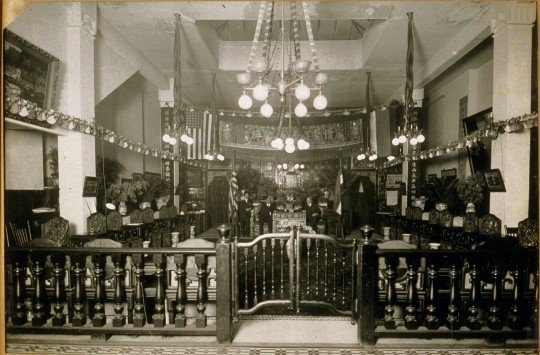
The meeting hall of the Chinese Six Companies, c. 1920 (by then incorporated as the Chinese Consolidated Benevolent Association) at 843 Stockton Street in San Francisco. Photographer unknown (from the Jese B. Cook collection of the Bancroft Library).
Chinatown's merchant community would face new challenges to their capacity as civic leaders when the political center of gravity across US Chinatowns would shift again in the last quarter of the 20th century.
[updated 2023-12-28]
#Chinatown merchants#Sing Man#Choy Chew#Chinese Merchants Exchange#Fung Tang#Lai Chun-chuen#Chy Lung & Co.#Yee Ah-Tye#Chinese Six Companies#Kai Suck#Ann Ting Gock#Lew Kan#Chee Kung Tong#Quong Lee & Co.
0 notes
Photo
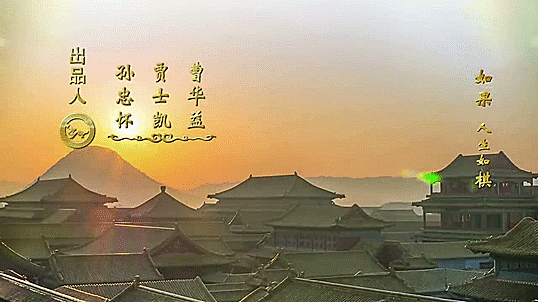
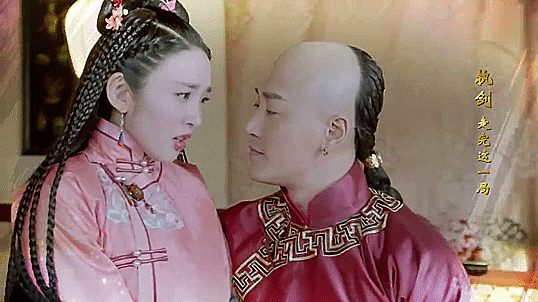

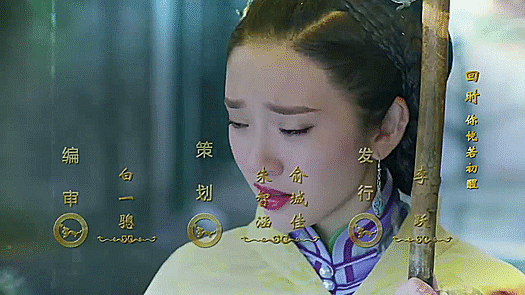

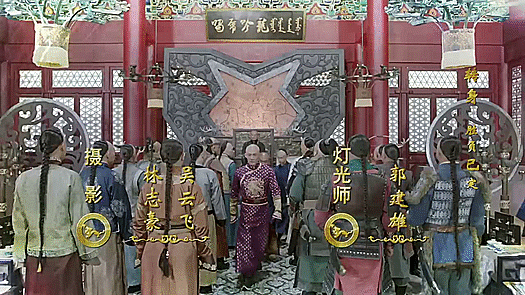


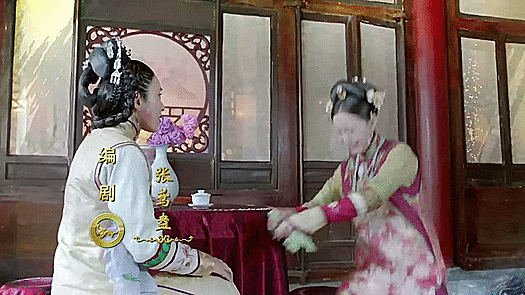
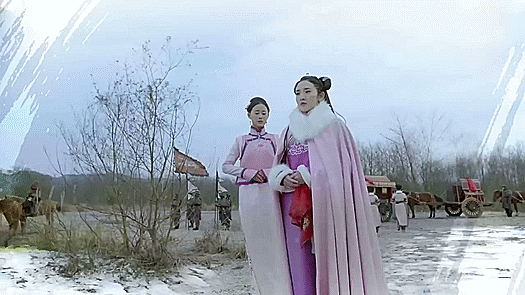
Cdrama: Rule the World (2017)
Gifs of Intro of cdrama “Rule the World”
【独步天下】第1集 | 唐艺昕、林峯主演 | Rule the World EP1 | Starring: Tang Yixin, Raymond Lam Fung | ENG SUB
Watch this video on Youtube: https://www.youtube.com/watch?v=x7ff33wevxk

#Rule the World#独步天下#Du Bu Tian Xia#An Unrivalled World#獨步天下#Dominate The World#2017#cdrama#chinese drama#episodio 1#1st episode#youtube#YoYo English Channel#Tencent Video#China Huanyu Ent. Official#YoYo TV#Tang Yi Xin#Raymond Lam#Lam Fung#Ray Chang#Zhang Rui#Jing Gang Shan#Chen Xin Yu#Huang Si Han#Wang Kai Yi#Li Ang#Xu Rong Zhen#Wang Yuan Hui
4 notes
·
View notes
Text
When you're a Cantonese family with the surname 慕容…

「你知唔知呢個姓以前係貴姓。」
“Don't you know, this surname was a name of nobility in the past.”
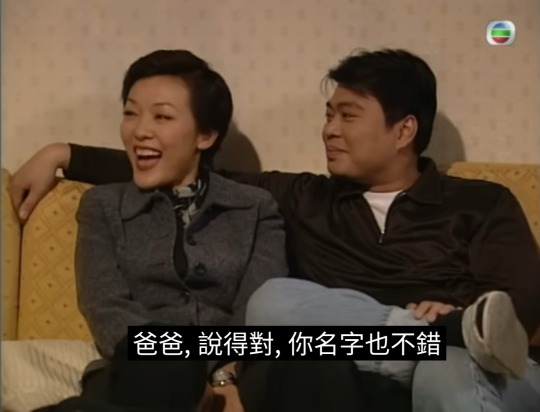
「老爺,噉呀啱嘞,你嘅名都唔差嘞!」
“Yeah Dad (Father-in-law), your name's not bad then!”

「慕容發,無人發!」
“Mouyung Faat, (sounds like) ‘no one gets rich’!”
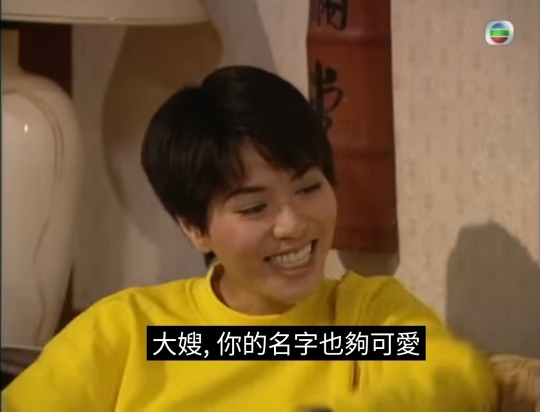
「大嫂呀,你嘅名又夠趣緻啦吓!」
“Sis (in-law), your name's pretty interesting too!”
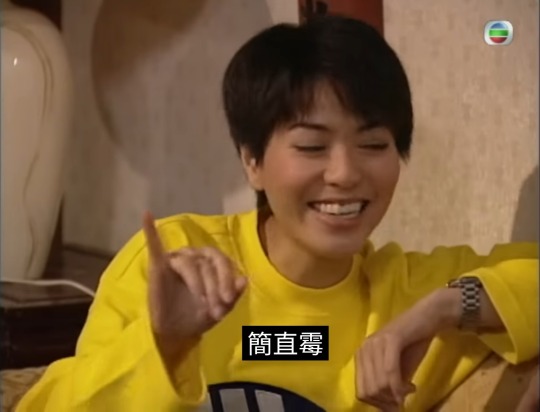
「揀剩尾*」 “Last one chosen!” (i.e. not desirable)
* Subs got it totally wrong; what she said was 揀剩尾 (pron. gaan² zing⁶ mei⁵), which is a play on her sis-in-law's name that is pronounced exactly the same in Cantonese; 簡靜美 (pron. Gaan² Zing⁶ Mei⁵)
簡直霉 (pron. Gaan² Zik⁶ Mui⁴) is totally off the mark! (Who subbed these subs?! NOT a Cantonese speaker is my guess!)

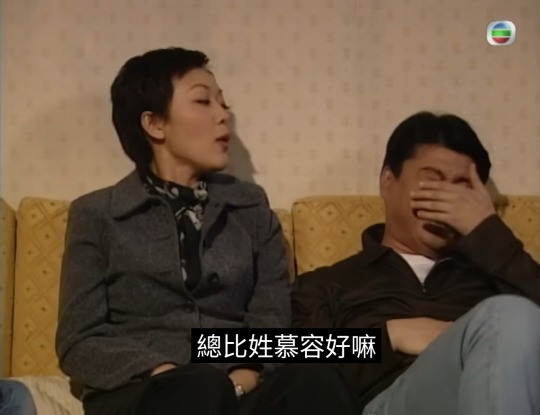
「噉都好過姓慕容啦!」
“At least it's better than the surname 慕容 (Mouyung)!”
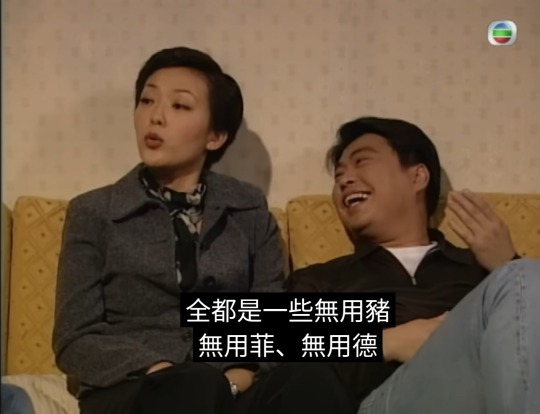
「改乜都係無用乜,無用物,無用德!」
“No matter how you name (a person of surname Mouyung), they will always be “Useless This”, “Useless That”, (just like) “Useless Tak!” (referring to her husband).
慕容 (pron. Mou⁶ Jung⁴), which, analyzing each character individually, can mean “admiration” and “capacity” respectively. Which makes for an awe-inspiring surname. Unfortunately in Cantonese, it sounds very similar to:
無用 (pron. mou⁴ jung⁶), which means “useless”! 😹
No such problem in Mandarin though, where 慕容 and 無用 are pronounced Mùróng and wú yòng respectively.
《師奶強人》 (1998) 第三集
#When you have a surname like this…just hope you aren't#Cantonese#笑笑笑#HK Drama#As Sure as Fate#TVB#Kwok Fung#Joyce Tang#Florence Kwok#Louis Yuen#Chinese Language#Language
1 note
·
View note
Text
a snuffle of criticism
Finished rereading Snuff by Terry Pratchett.
It was great (as usual, once I made a tier-list of Discworld books and it was super unhelpful because I basically only used ranks S, A, and B, haha)
However, I think it was a mistake to indulge in the temptation to... make up a lot of fake Chinese names for things? (Example: “And you know how to do that: use the old Bang Suck Cling Buck on them, eh?” “Yes, sir, that’s a recipe for shoe polish, sir, but I’ll bear it in mind.”) Sir Terry... Please refrain.
I’m sure that, if he had been granted the time, he’d have stopped doing that, but... it’s too bad he didn’t have the time.
Anyway! On to my Tiffany Aching reread
#I say this as a person who really loves Interesting Times too#which i know is probably hypocritical#but the joke about the tangs the fungs the sungs and the mcsweenies gets me every time#i am a slight fan of the throwaway line in the other book with constable ping#it's a dialect word for water meadow sir#my dad worked with a lady whose name was shu-ping which translated roughly to virtuous duckweed#also constable pings name is only ever treated as passing detail instead of a recurring gag#snuff (discworld)
2 notes
·
View notes
Text
#Hong Kong Polytechnic University#PolyU Seige#antielab#反送中#hong kong#hong kong free press#Yau Ma Tei#Stanley Chan#Hung Hom#politics#Tang Tsun Kit#Chow Fung yin#Cheung Tsz Ching#Reaf Yuen#Chester Wan#Wu Hoi Wai#Xu Peng Yi#Yip Wing San#news
0 notes
Photo







0 notes
Text
July 18 - Taipei - Bar Crawl, Din Tai Fung, Fort San Domingo
Before I write about my activities for today, I did a few things after writing my blog post for yesterday. First, Andy had found a gym near the Taipei Arena that you can use for just 50 NTD, so we went, and I worked out for the first time in over 2 weeks! It was absolutely amazing to be able to lift weights and get a workout in. However, once we finished, we had about 45 minutes to go home, shower, and eat before we planned to meet a group of friends to go to a bar crawl in New Taipei. So, we took the MRT home, found a bento box shop, and got a quick meal. The bar crawl was fun. We stopped at 3 bars around the city and ended off in a nightclub. It was interesting to talk to the other people on the bar crawl (one was from Manchester, one from Chicago, and another from London). At around 12:30 am, when we were inside the nightclub, all the lights turned on, and the police checked everyone's IDs. After asking a local, apparently, these raids usually happen once a night to look for underaged people. We were only allowed to have whisper conversations, couldn't move from where we were, and had to wait about 20-30 minutes while the police checked everyone's passports or IDs. A super interesting experience, for sure.
Today, we woke up around 10:30, and a group of us went to Din Tai Fung, an extremely popular and famous Xiao Long Bao restaurant in Taiwan. We decided to go at 11 because the wait time can be over an hour if you go at a regular lunchtime. We had xiaolongbao, pork buns, Suan La Tang, noodles, fried rice, and chocolate xiaolongbao. It was all absolutely delicious, and I might have to go back before leaving Taiwan.
We met the group in the lobby at 1:30 and headed to Fort San Domingo. This was in northern Taipei (Tamsui), so the train ride was quite long. Fort San Domingo was worth this travel time because the view was breathtaking. The fort was a fantastic piece of history as it was transferred between many countries. There were 8 flags outside to represent the different nations that have been there or had control of Taiwan at some point.
Finally, we walked down to the river and hopped on a ferry boat. The views of the city and mountains from the ferry were stunning!
Academic Reflection
When it comes to learning about the history of other countries in Taiwan. Right outside the fort, there were 8 flags; Spain, Netherlands, Kingdom of Tungning, Qing Dynasty, Great Britain, Japan, Australia, United States, and Taiwan (ROC). Peter explained that each of those flags represents the past nations who have occupied this fort. The number of times this fort has transferred to other countries was very interesting. The Spanish built the fort but then destroyed it when the Dutch took over. The Dutch then rebuilt a fort in the same place. Then, when the Qing dynasty repaired the fort during their rule, they leased it to the British. After the ROC and British cut official diplomatic relations, it was leased to Australia and then the United States! Soon, though, the U.S. decided that Taiwan should control itself and give it back.
Because so many countries inhabited or rebuilt this fort, several architectural differences can be seen in it. One is the different styles of bricks. What I found the most interesting was that there were holes for cannons originally, but once the British came and used it more as an office and embassy, they transformed the cannon holes in the buildings into French-style windows.










3 notes
·
View notes
Text
If I don’t get more Xiaolin Showdown X Lego Monkie kid fanfics I will die immediately
There are so many opportunities people!
Thus I have taken the time to compile a list.
Jack Spicer is Spicynoodles kid. He just shares so many of their qualities. His wu of choice is the monkey staff. THE MONKEY STAFF! He loves robotics. He has red hair. He’s a huge fanboy. You can’t change my mind on this.
Mei is related to Chase and she finds out from an old book somewhere that he’s still alive so she goes and visits him causing her to get wrapped up in the Heylin/Xiaolin conflict.
Jack Spicer is Red Son and has just been doing showdowns to cure his boredom and test his robots.
MK finds out that Omi is a relative of his and visits the temple to meet him. He ends up involved in the conflict as a result and proceeds to wipe the floor with everyone. Especially Bean.
Jack grows up to be Tang and during an incident ends up back in time. He then proceeds to flaunt his powers as the Golden Cicada and Master Fung just thinks he’s awesome.
And I have more of which I will keep adding on as I think of them!
Someone write this!!!
#lego monkie kid#lmk#mk#mei#red son#chase young#jack spicer#master fung#omi#xiaolin showdown#heylin#Hannibal bean#fanfiction#fanfic#crossover
29 notes
·
View notes
Note
if u were a soup what kind of soup would u be.
if I were a soup I think I’d be sun roasted tomato soup. While I’ve never tasted it, I do feel like the the descriptors “sun roasted” and “tomato” fit me quite well; I feel like both of those things very often given how much the sun hates me and the average redness of my face. There also used to be a bread bar at that popular pizza place in town (they got rid of it during the pandemic) which had a sun roasted tomato butter which I loved a lot. The golden orange colour was nice. I liked it a lot. I miss that bread bar.
🪻 anon should also answer this if want.
That is a tough tough question you've left for me, Ainsel dearest. Tbh if I were a soup I'd be......... a nice good ol' hearty lotus root and pork rib soup (lian ou pai gu tang/莲藕排骨汤) ! The rest is utc because I yapped LOL
I might be biased coz my grandma used to cook a really really good version of this soup but I think it matches me well enough? It's a simple soup, the overall flavour isn't too heavy, the soup is soothing and warm and slightly sweet, and it pairs well with a variety of dishes o7 I think it matches somewhat with how I carry myself around people in my day to day life,, if that makes sense LMFAOOOOO
SUN ROASTED TOMATO SOUP!!!! I think it's a good soup match for you, you've always been nice and you always seem so warm whenever we talk 👍 also sun roasted tomato butter sounds so good... I need to make some asap omg where do I even find sun roasted tomatoes........ hearing u talk about that bread bar makes me wish I could've tried it... bread... [forlorn sigh]
🪻 NONNIE!!!!! we need your soup match (if you want to share of course!)
was also tempted to say that I could be the spicy sour soup that you can get at Din Tai Fung (suan la tang/酸辣汤) but that's kind of just because I was drawn to the tangy flavour but couldn't figure out how it fits me.
#📜.qi chats#chats with ainsel!#good lird this got long#I love soup guys can you tell#I miss my grandma's lotus root and pork rib soup DAMN#I should ask her for the recipe... if she still remembers it orz......#I don't have that soup pot she uses though
3 notes
·
View notes
Note
hello!! i'm looking for an fc for a taiwanese man, around late twenties to early thirties, with kind of a charming-but-shady sort of energy? shady as in subtly insulting, not necessarily suspicious. thank you!!
Rhydian Vaughan (1988) Taiwanese / British.
Bryan Chang (1988) Taiwanese.
Nick Chou (1988) Taiwanese.
Chase Tang (1988) Taiwanese.
Liu Kuan-ting (1988) Taiwanese.
Austin Lin (1988) Taiwanese.
Prince Chiu (1989) Taiwanese.
Henry Lau (1989) Taiwanese / Teochew Hongkonger.
Wayne Huang (1990) Amis Taiwanese.
Jake Hsu (1990) Taiwanese.
Christopher Fung (1990) Taiwanese.
Bruce Hung / Bruce He (1990) Taiwanese.
Darren Wang (1991) Taiwanese.
Bie Thassapak Hsu (1991) Taiwanese / Thai.
Jass Yang (1991) Taiwanese.
J.C. Lin (1991) Taiwanese.
Simon Lian (1992) Taiwanese.
Giullian Yao Gioiello (1992) Taiwanese / Italian.
Lai Yanju (1992) Taiwanese.
Derek Chang (1992) Taiwanese.
Aaron Lai (1992) Taiwanese.
Dino Lee (1993) Taiwanese.
Fandy Fan (1993) Taiwanese.
Sam Lin (1993) Taiwanese.
SHUO / Lou Junshuo (1993) Amis and Han Taiwanese.
Edison Song (1994) Taiwanese.
Tsao Yu-ning (1994) Taiwanese.
Patrick Shih (1996) Taiwanese,
Here you go!
6 notes
·
View notes
Text

A Forbidden Happiness | Chapter 11
In the Forbidden City, many preferred to be sent to the grave rather than to The Office of Careful Punishment. If you came back at all, you didn't come back whole. His Majesty liked to pretend that the guards and momos in the Office of Careful Punishment were upstanding people, only striving for truth but everyone knew that a few pieces of silver or a promotion for a close relative could have a witness turned into a corpse. The guards that stole her away from Molan were none too gentle as they pulled her down the winding streets. The frozen fear wrapped around her body transformed into an inferno as the gates of The Office of Careful Punishment came into view.
Jiayi wondered if she would ever see the sun again as she was pulled deeper into the bowels of the building. The smell of piss and blood churned her stomach. Jiayi glimpsed the sight of a limp hand for only a moment before she snapped her eyes shut. She couldn't dampen the sounds of the screams and grunts of pain but she could close her eyes to the gruesome truth. The guards pushed her to the ground of the cell and slammed the door behind her. The cell was completely bare save for a moldy hay-filled bed and a commode. If Jiayi stretched herself out flat, she would be able to touch both walls. The guards tugged at the lock of the cell before striding away. Jiayi snatched her hand off the floor as a mouse scurried by and into the hall. She couldn't smother her gasp at the sight of a crew of eunuchs towing away a body covered in a bloodied sheet. Walking leisurely behind them were a pair of momos. The taller of the two was wiping her wet hands with a rag while the other glanced into Jiayi's cell.
"Yo! Yi momo, isn't that one of the girls we whipped some time ago?"
Yi momo, peered between the bars of Jiayi's cell before smiling, showing off her missing teeth.
"It looks like you're right, Qi momo. Some of these girls never learn," she said with a shake of her head.
With a sigh, Qi momo crossed her arms, "I hope she didn't piss off His Majesty too much. We worked all morning on that one," she said, nodding her head to the hallway where the body was carried out.
"Let's have lunch before they come find us," said Yi momo.
The pair left, leaving Jiayi alone again, with only the sounds of the other poor souls in the jail to keep her company. The metallic tang of blood overwhelmed her at last. She crawled over to the commode and wretched before pushing the bucket away. Curling up on the pile of hay masquerading as a bed, Jiayi tucked her face into her knees. Her journey to the Forbidden City so many years ago started very like this. Dragged away and put behind a cage, only this time Jiayi wasn't sure if she was going to come back out.
Had Fung gonggong given her up? Did they already know she was guilty? Would they execute her? Jiayi's crime wasn't so grave. She had been a good maid to Xiang gui ren all this time and hadn't caused trouble. Being beaten to death was terrifying but it was a far better outcome than being sent back to Su gonggong. Thinking of the man again, Jiayi was surprised to feel a hot rush of anger slice through her body. The sheer force of it brought tears to her eyes.
Why couldn't he just leave her alone? Was she the only woman in the Forbidden City he could torment? This was the closest she had ever been to happiness and that disgusting man was doing his best to snatch it away from her.
"Jiayi," a slimy whisper called.
Fighting the urge to scream, Jiayi picked up her head and looked at Su gonggong. The man was pressing his gaunt, gray face between the bars, gnarled hands gripping the metal tight.
"You're in a bad way, aren't you, my dear," he cooed, "I have a few connections here, if you promise to be a good girl I can–"
Sick of hearing the shit that Su gonggong was spewing, Jiayi picked up the commode bucket and lashed the contents into his face. The man retched and sputtered, wiping the acrid liquid from his eyes.
"You stupid bitch! I should slit your fucking throat! And they'll let me when they're done with you!"
"Shut up back there!"
A scowling guard stopped in front of Jiayi's cell. He covered his nose at the sight of Su gonggong.
"Daren," Su gonggong said, bowing low, "It's really nothing,"
"You fucking stink. Get out of here," the guard snapped.
"But daren, you promised me a bit more time, didn't you?"
The guard kicked Su gonggong to the ground, "I don't make deals with dogs. If you stay here any longer I'll throw you back in here,"
"Of course, daren, of course," Su gonggong replied before he crawled away.
The guard glared down at the ground where Su gonggong used to be and then at Jiayi.
"Disgusting," he muttered as he returned to his post.
Jiayi sank to the floor and curled herself up again. It was like her head was stuffed with cotton. She couldn't even try to think straight. First, she was afraid, then angry, and now? Jiayi was exhausted.
She didn't realize that the woes of the day had dragged her down to sleep until the sounds of someone calling her name jostled her awake.
"Jiayi!"
She opened her eyes and saw a man with a sword. A guard? Jiayi rubbed her eyes clear and felt awash with relief when she realized who it was. It was Chang daren!
Hauling up her sleep-heavy body, Jiayi faced the bars, deliriously happy to see this familiar face.
"Chang daren," she said, "What are you doing here?"
"Molan told me," he replied. Chang daren looked over his shoulder, "I can only stay for a moment. For your sake, I hope this is all a misunderstanding,"
Jiayi tightened her hands around the prison bars and shook her head, "If you let me explain–"
"What were you thinking?! The Empress Dowager doesn't take that sort of thing lightly!"
"The Empress Dowager?" Said Jiayi, her confusion mounting, "Why would Her Highness care?"
Chang daren curled his lip in disgust, "You sent her granddaughters pornography! Why wouldn't she care?"
––––
Her royal daughter-in-law would not look into her eyes.
Good.
It had been two days since Xiang gui ren's vulgar crime was revealed and His Majesty finally stopped dragging his feet on the interrogation. It was infuriating! Her precious granddaughters came so close to seeing such repulsive things but because that Xiang gui ren was in the thick of it, he found other things more important. The Empress Dowager was glad Shen huang gui fei was available to urge him. De gui fei didn't dare bother His Majesty, despite the chastity of her only daughter being on the line.
Pathetic.
Yet she still had the nerve to sit in Yangxindian alongside The Empress as if she was wronged.
The Empress Dowager glared at her son, "The moment that woman set foot in the Forbidden City, a gust of wind doused every candle on my altar. I knew how much you wanted this woman here so I never mentioned this bad omen but look now! Look at what she and her filthy maid had the chance to do! Your Majesty, you must not let her get away with this crime,"
Shen huang gui fei, sat at her side, rose to pat The Empress Dowager's back, "Your Highness, please calm down,"
It was like everything she said went in The Emperor's ear and out the other. The Emperor didn't bother to reply, choosing to sip leisurely on his tea, a petulant set to his brow.
"Royal mother, we don't know yet if Xiang gui ren had anything to do with this. It could just be the wicked trick of a lowly slave," said The Empress.
"Yes," said The Emperor, "I won't stand to hear Xiang gui ren's name slandered over assumptions,"
The Empress Dowager waved Shen huang gui fei away and tried to hide her anger behind her handkerchief as she dabbed her forehead . Assumptions are what got her into this mess.
The day that her son was granted the title of crown prince was both the happiest and most terrifying day of her life. She had just been imperial concubine then, favored for many years but still not good enough to promote. The decree made her sacrifices worth it but, she knew that having a crown prince son was only the beginning. Having a crown prince son meant that suddenly her three daughters were more of a boon than ever. Marriage to them meant close connections to the crown prince and close connections to her Borjigit clan, which had been failing to do so the last few years.
As a daughter of the Borjigit, The Empress Dowager decided that her son's reign would be the era of Mongols. It was more than amusing to rub that little fact in the former Empress' face as stuck up as she was. The Empress Dowager was glad once more the woman died before she could see what the back palace had become.
So of course Zhengshi's primary wife had to be a Mongolian gêgê. The moment she put the word out that the crown prince was looking for a di fujin, her palace was never empty. Jerjer's hand ached from all of the portraits of potential matches she had to unroll. It all seemed fruitless until she came across one girl.
Altanchimeg, a distant cousin of hers.
The name sent shivers down her spine.
Golden Ornament.
Yes, Altanchimeg was to be the crown jewel of her reign as The Empress Dowager.
Looking back, The Empress Dowager couldn't believe what a fool she had been. Altanchimeg was no more than a thorn in her side. The girl was docile but only to her son. She refused to do her rights as a daughter-in-law and bent to The Emperor's every whim saying some nonsense that Zhengshi was her first master.
As if The Empress Dowager wasn't the master of him!
She was completely useless and couldn't even keep Zhengshi's first son alive. She was boring, unappetizing, and hard-headed. The only reason The Emperor still favored her was because she never said no.
At the very least, Shen huang gui fei had been useful to her these recent days.
"Jiejie has to be right," said Shen huang gui fei, "I couldn't imagine having such a woman around my daughter day in and day out. So it must be the maid, it must!"
The Emperor turned to De gui fei, "What do you think?"
She raised her head and declared, "I don't believe she did this,"
The Empress Dowager was prepared for a lot of things to come out of the noble consort's mouth, but that was not one of them. A glance at Shen huang gui fei showed that she was just as surprised.
"I don't believe Xiang gui ren would compel Jiayi to do this and don't believe Jiayi would ever do something like this,"
"De meimei," said Shen huang gui fei, "You've only known Xiang gui ren and her household for maybe two months. How could you know what sort of face she's hiding?"
The Empress Dowager didn't miss the frosty stare De gui fei aimed at Shen huang gui fei.
"Your Majesty, Your Highnesses," said a junior eunuch, as he entered the room "The maid has arrived,"
––––
"Your slave Wei Jiayi greets Your Majesty the Emperor and Your Highnesses,"
Jiayi went to her knees and pressed her forehead to the ground. The air inside the room felt heavy. Jiayi had been inside these rooms many times with her mistress. His Majesty aside, the twinkling gold fabrics and rich wood were a perfect accompaniment to Xiang gui ren's brilliant laughter and cheerful voice.
Now?
The edges in the room were sharper, the wood black as night. The paintings of fierce animals threatened to jump from the wall and tear her to pieces. She didn't know why Xiang gui ren wasn't there. She hated that Xiang gui ren wasn't here. There was no one here to defend Jiayi but herself.
She was all that she had.
The walk from The Office of Careful Punishment had been long and silent. All Jiayi had to ground her were her thoughts and the pain in her arms. There was no point in doing anything but defend herself. If there wasn't a chance that she could save herself, she would already be dead, wouldn't she?
Jiayi was determined to try.
"You know why you're here then?" The Emperor asked.
"Yes, Your Majesty," Jiayi replied, "I do know. But didn't do anything of the sort. I would not dare,"
Jiayi tried to raise her voice, to speak with determination but it felt like someone was pulling a rope tighter and tighter around her neck. She could only whisper.
"You've never seen these before?"
Jiayi raised her head as Zhang Wei loomed over her with a small stack of papers held out in front of him. With shaking fingers, she took them. The first thing she noticed was how smooth and fair the paper was. Jiayi had never felt paper that fine, not even in De gui fei's palace. The second thing she noticed was how depraved the drawings were. It made her face burn red just glancing at them.
The first parchment had a group of men, nude, bodies writhing together in decadent ecstasy. The next had a woman subjugating herself behind a completely naked man. The last parchment was the worst. A man using a woman's bare feet* to rub his member up against. It slipped from her hands in shock.
"Your Majesty," she said, finding her voice, "I've never seen anything like this before,"
The Emperor stared down at her, "I've never seen those before either. No one in the Pavilion of Beguiling Sights would dare create these. I've heard talk that you're very talented with a brush and something like this would come naturally to you,"
"I would not dare!"
"You wouldn't dare? Yet somehow these disgusting things were delivered directly from Xianfugong," The Emperor replied.
"Jiayi," said Shen huang gui said with a warm smile, "The only way forward is, to tell the truth now. You must be honest if someone instructed you to do this. His Majesty will investigate thoroughly and treat you accordingly,"
"Your Highness, no one instructed me," Jiayi paused to take a deep breath, "I couldn't have drawn in the first place. I've never held such fine paper in my life,"
She held the paper back out, "Such good parchment is commonplace to you, Your Majesty but I've never come across it,"
Shiyi took the paper from Jiayi and gave it to The Empress who ran a gentle hand across it.
"Your Majesty, isn't this the bamboo paper from the Northern Tribute?" She asked, "Didn't you only grant this to royal mother and the master in Dafuge?"
The Empress Dowager's mouth popped open for a moment, before she gathered herself, "Xiang gui ren and her maid spent plenty of time there, didn't they, De gui fei?"
De gui fei could only nod.
"Who's to say she didn't steal it?" Said The Empress Dowager.
The Emperor let out a breath and began massaging his temple. Wang gugu then came to The Emperor's side, "Prince Han is here,"
Prince Han walked inside and came to a stop next to Jiayi and greeted His Majesty. Jiayi knew that Wang gugu said that Prince Han had arrived and the person next to her looked just like him, but Jiayi could barely recognize the man beside her.
The wide mouth and erupted in laughter with ease were gone. The eyes that curved with each smile were gone. The body that lounged on beds and tickled the First Princess was gone. Next to her was a man who had seen things she couldn't imagine.
This was the famous Prince Han of the Third Rank.
"What brings you here?" Asked The Empress.
"The servants are saying that Your Highness and Your Majesty are investigating a matter of injury to First and Second Princess. Your Highness would not dare let something like that happen to her children so I came here to learn the truth at once," replied Prince Han.
"Prince Han, jiejie, of course, loves First Princess and Second Princess like her own daughters" said Shen huang gui fei, "But she can't help it if someone took advantage of her grace. We all make mistakes,"
Prince Han tossed his flinty eyes to her, "And what mistake was made?"
Shen huang gui fei ducked her head, "I don't dare say it,"
Jingse raised her chin, "Xiang gui ren's maid, drew this disgusting work and delivered it to De gui fei, First Princess and Second Princess. The evidence is right there,"
Jiayi flinched when Prince Han's open hand dropped in front of her face. It took her a moment to realize he was asking for the paintings.
Prince Han looked at the drawings for a moment before carelessly tossing them to the ground.
"This maid did nothing of the sort,"
"You're so sure?" Asked The Empress Dowager.
"Of course. Wei Jiayi is an ignorant servant from a small family that served a small clan. How would she know what anything during that Tang Dynasty looked like?"
The Emperor took the drawing from The Empress' hands and held it close to his face. Jiayi felt her stomach flutter as his shoulders lowered in relief.
"Prince Han is very diligent. The hair and decor, they're all Tang. Even I couldn't recognize it at first,"
Shen huang gui fei bowed her head, "But Your Majesty, even if this maid didn't draw these, how in the world did they end up being delivered straight from Xianfugong? I won't be able to rest if we don't get to the bottom of this,"
What little hope Jiayi had of getting out of this alive was dashed against the rocks.
Another of The Emperor's eunuchs came into the room and announced that Fan da ying had arrived as well.
"Tell her to come back another time," said The Emperor.
The eunuch paused before saying, "Fan da ying says she has information about the lewd drawings,"
"Let her in,"
Fan da ying's slight figure kneeled next to Jiayi and greeted the room.
"Rise," said The Empress, "Fan da ying, who informed you about what was happening here today?"
"Your Highness wouldn't know because no servants would dare spoil your ears with gossip, but this is all over the palace. First Princess' nursemaid stirred up such a fuss that even I heard about it at Jingrengong,"
"Loose-mouthed layabouts," said The Empress Dowager, "Jerjer, spread my decree. The matter today regards the chastity of the royal heirs of the Imperial Family. Anyone speaking of it will be put to death,"
Jerjer nodded and left to do as told.
"Fan meimei, you've only just become His Majesty's woman yourself. What do you know about what's happening today?" Asked Shen huang gui fei.
"Your Highness, I can vouch that those drawings never came from Xianfugong at all. That day, I asked Xiang jiejie to play her guzheng for me and looked at the drawings that were laid out. None of them had anything like that in them. Xiang jiejie bothered with me for hours, even having dinner with me. Her servants didn't have a moment to step inside to do something nefarious," said Fan da ying.
"You don't think a servant could have added these things during the trip over to the A Ge Suo?" Shen huang gui fei asked.
"Your Majesty, Your Highness The Empress, this is where I confess my crimes. I was curious about the A Ge Suo so I followed Xiang jiejie's servants there to see if I could go inside and see the children and perhaps be blessed by their energy. But the momo wouldn't let me or the servants take more than a half step in. I watched the servants hand the momo those trays with nothing dirty inside. It could've only been added in the A Ge Suo itself,"
"Fan da ying, to steal into the A Ge Suo without permission is a heavy crime," said The Empress, her voice grave but soft.
"I know my wrongs," said Fan da ying.
"However, seeing that you've cleared Xiang gui ren from being associated with an even heavier crime, I can only punish you lightly. Return to Jingrengong and reflect on your actions," She turned to The Emperor, "Is a week long enough for Fan da ying to reflect?"
The Emperor nodded, "Yes, I believe Fan chang zai will have reflected well in that time,"
The newly titled first-class attendant gasped, a bright smile on her face, "Thank you for your grace Your Majesty, thank you for your grace, Your Highness!"
"Jiayi," said The Empress.
Jiayi turned back to The Empress, "Your servant is here," she replied.
"Go back to Xiang gui ren and tell her all is well,"
Jiayi couldn't stop the few tears that rolled down her face, "Thank you, Your Highness. I'll take my leave now,"
She scrambled to her feet, desperate to be at the end of this oppressive journey only to forget that kneeling rigidly for so long left your legs numb and clumsy. Her knees gave way and she stumbled into Prince Han's side. Jiayi steadied herself immediately, refusing Sang'er's helping hand.
She just wanted to go home.
–––––––––
*Even though the Manchurian Qing dynasty didn't believe in foot binding, they still carried the idea that a woman's feet were her most private place, even more private than her vagina or breasts. You'll find that when erotic works from dynastic China have completely nude women, the feet are always covered.
Previous Chapter | Next Chapter
(You can vote for this story on wattpad here)
#wattpad writer#wattpad#historical#perioddrama#ruyi's royal love in the palace#qing dynasty#WIP#writing#writer#chinese novel#cdrama#booklr#work in process#writeblr#empresses in the palace#costume drama#historical fiction#the forbidden city#web novel#a forbidden happiness
2 notes
·
View notes
Text
New Journey to the West (CMS) (1990) 新西游记
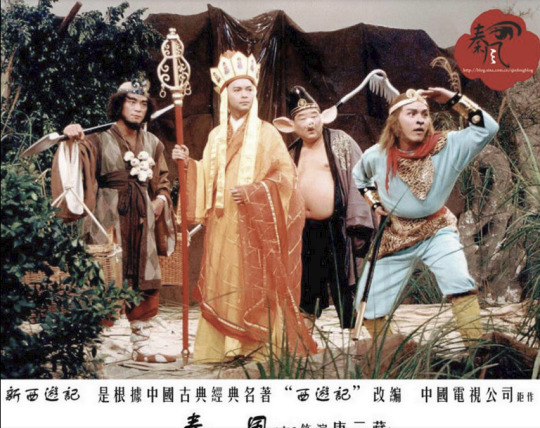
Director: Wang Wei-Chiang
Starring: Chun Fung / Wang De-Zhi / Chan Yat-Long / Lin Chun-Han / Ying Hsiao-Wei
Genre: Fantasy
Country/Region of Production: Taiwan
Language: Mandarin
Date: 1990
Number of episode: N/A
Type: Retelling
Summary:
"Journey to the West" is a mythical story familiar to both adults and children. However, it is not easy to make the familiar story moving. Many versions of "Journey to the West" series have been filmed and broadcast in the past. It is not aired in prime time, but "New Journey to the West" is the first time to be broadcast on prime time TV. The content and story structure must be completely refurbished. Therefore, "New Journey to the West" added Nobita, the protagonist in the Japanese manga "Doraemon".
The characters in "New Journey to the West" are a great combination of "Journey to the West" and the cartoon "Tinkerbell", except Tang Sanzang, Monkey King, Zhu Bajie, Sha Wujing, Bull Demon King, Princess Iron Fan, etc. in "Journey to the West" In addition, there are also characters such as Nobita, Ah Fu, Ji An, Yi Jing in "Tinker Bell", which are all characters loved by children.
These lively characters, under the brilliant pen of the screenwriter of "New Journey to the West", traveled through ancient and modern times, interweaving interesting stories. The warning philosophy contained in it has a subtle educational effect on children.
"New Journey to the West" still mainly tells the mythical story of Tang Sanzang's master and apprentice going to the west to learn Buddhist scriptures. On the basis of respecting the original work, artistic processing is carried out, and the portrayal of the characters in the play is more delicate. Compared with "Journey to the West", it is more It is more humane, more humorous and witty, and the whole plot is more vivid and watchable; it can also be said that this is the most humane adaptation of "Journey to the West", because the love story makes the protagonist here no longer a god, but more Like a person of flesh and blood, Tang Sanzang talked about polygamy love in the play, and the love between Monkey King and Zhu Bajie and others is also very interesting.
"New Journey to the West" interprets Tang Sanzang, Sun Wukong, Zhu Bajie, and Sha Wujing with the most magnificent scenes, the most vivid plots, and the most funny actions. In order to make "New Journey to the West" have unexpected The "hilarious" effect, the cast selection process of the whole drama is also painstaking. In addition to the four soul characters in the drama, the mentor and apprentice, CTV also leveraged its network and invited a large number of beautiful actresses to come to guest roles. The cast is unprecedentedly strong!
At that time, Qin Feng appeared in "New Journey to the West" on the China TV channel just after the release of "Shuangfeiyan" starring in Taiwan TV. In order to play Tang Sanzang well, he reluctantly shaved his head. Long Chuanren and Wang Dezhi played Monkey King and Zhu Bajie. Although the "Journey to the West" they performed in the past has never been broadcast on prime time, their "Sun and Pig" appearances are unmatched among the three channels, so it is very appropriate for them to be played by the two of them; in "New Journey to the West", the most humorous character is Sha Wujing, played by Chen Yilang, the singer of Hokkien. Chen Yilang is usually taciturn, but his sense of joy. He is natural, and often has unexpected dramatic effects. Just looking at his Sha Wujing appearance is enough to make people laugh. Sha Wujing doesn't have many lines, but Chen Yilang's Taiwanese Mandarin will definitely make you laugh out loud.
The story of "New Journey to the West" begins with the story of Tang Sanzang's journey to the West to learn Buddhist scriptures. On the way, he conquered the horse, the monkey Wukong in Wuzhishan; the pig Bajie in Gaojiazhuang; Tang Sanzang, Sun Wukong, Zhu Bajie, and Sha Wujing, four masters and apprentices, went to the west to learn Buddhist scriptures. They passed through the Flame Mountain, but the fire was so fierce that they couldn't do it; Princess Iron Fan (played by Liu Fangying) refused to lend her fan to Wukong to extinguish the flames. Cheat a fan. Later, the four of them met the Bone Demon sisters (played by Xiao Qiang and Ge Weiru), Wukong fought against the Bone Demon, turned into a magic trick, and tried his best to escape the danger.
After Tang Sanzang and his disciples left Zhu Ziguo, they continued to walk towards the west. They walked to a courtyard. Tang Sanzang decided to go to Huazhai by himself. When he walked into the courtyard alone, he saw four women embroidering flowers and three women kicking ball, when Tang Sanzang explained his purpose, seven women suddenly rushed forward, took Tang Sanzang into a gloomy stone cave "Pansi Cave", tied him up, hung him high on the beam, and spit out the water from his mouth. Silk threads were woven into a big net to seal the cave door; Sun Wukong, who had been waiting for his master for a long time, suddenly felt that something was wrong, so he chanted a spell and summoned the local land god, only to realize that his master might have fallen into the hands of the seven spider spirits. In the hands; Wukong, Bajie and Sha Wujing made a big disturbance in Pansi Cave, and only rescued the master under the explanation of Pilanpo Bodhisattva.
This episode is taken from the novel "Journey to the West" "Pansi Cave Stick Beating the Spider Spirit", and cleverly divides the seven spider spirits into seven colors. Each spider spirit is played by a porn star, including Hua Xuanxuan The red spider from Wang Baoyu, the golden spider from Long Juner, the yellow spider from Tian Lulu, the blue spider from Li Qian, the silver spider from Xu Ruohua, and the white spider from Xu Xiaoling. , and the layout of Pansi Cave is full of sexual symbols, these seven actresses almost steal the scenery of the four masters and apprentices in the play.
Tang Sanzang, Sun Wukong, Zhu Bajie, and Monk Sha traveled to the Daughter Country of Xiliang. The country is full of women, and the family is passed down to the next generation. Can only have girls. It is said that Tang Sanzang passed by to learn Buddhist scriptures, and the Queen (played by Liu Ming) intends to recruit Tang Sanzang as a son-in-law for the princess (played by Hua Fang); the matter is discovered by the scorpion spirit and the viper spirit. , wanting to profit from it. During the filming, Wang Shizheng, the editor-in-chief of the program department of China Television, once asked Qin Feng, "Do you think Tang Sanzang fell in love in the daughter country?" At that time, Qin Feng thought that Tang Sanzang had made a decision after a lot of psychological struggle; but the editor-in-chief Wang Shizheng thought that Tang Sanzang was not emotional at all, he was a firm learner from beginning to end. In order to "correct" Qin Feng's understanding of Tang Sanzang, Wang Shizheng also recommended many books for Qin Feng to read.
Source: https://en.hkcinema.ru/film/20161
Link: N/A
#New Journey to the West#CMS#chinese mythology stories#新西游记#jttw media#jttw#jttw television#television#lost media#live action#Retelling#sun wukong#zhu bajie#sha wujing#Tang Sanzang#monk tripitaka#Addition
6 notes
·
View notes
Photo
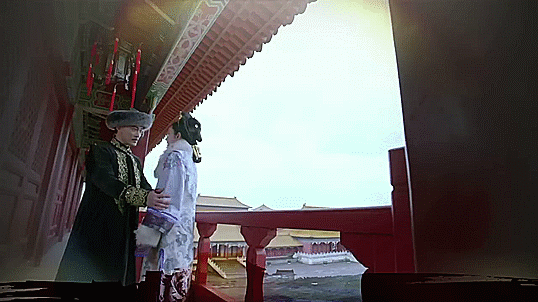
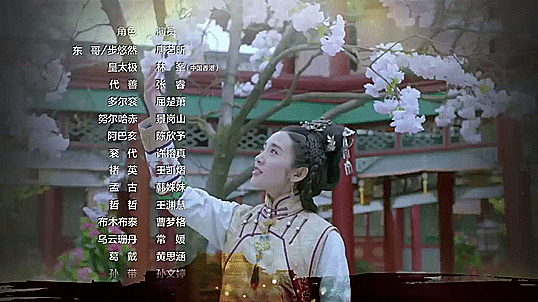


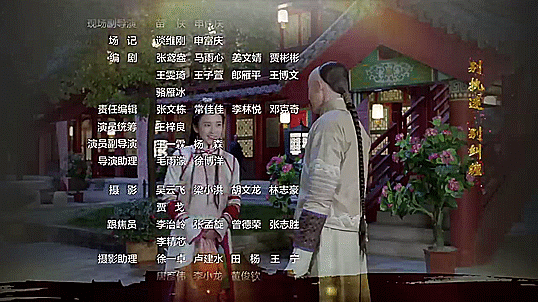

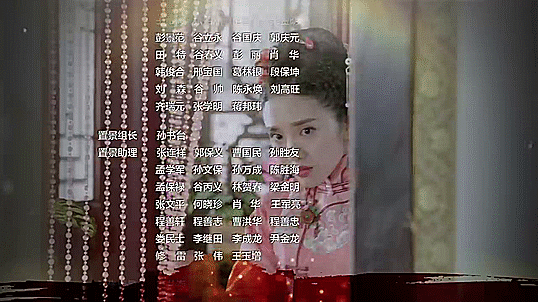



Cdrama: Rule the World (2017)
Gifs of Ending of cdrama “Rule the World”
【独步天下】第1集 | 唐艺昕、林峯主演 | Rule the World EP1 | Starring: Tang Yixin, Raymond Lam Fung | ENG SUB
Watch this video on Youtube: https://www.youtube.com/watch?v=x7ff33wevxk
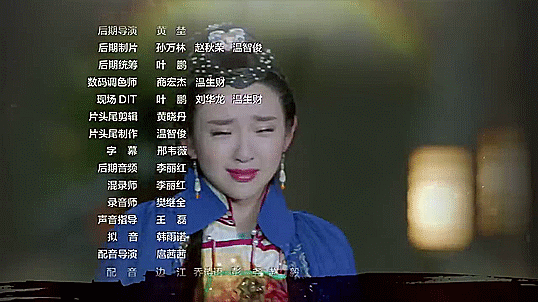
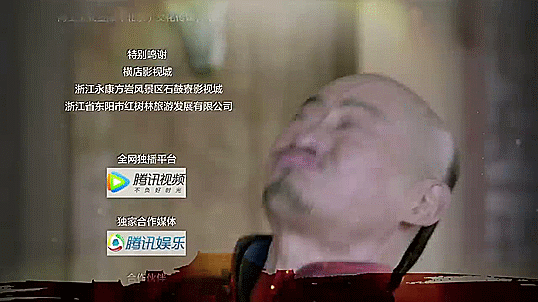
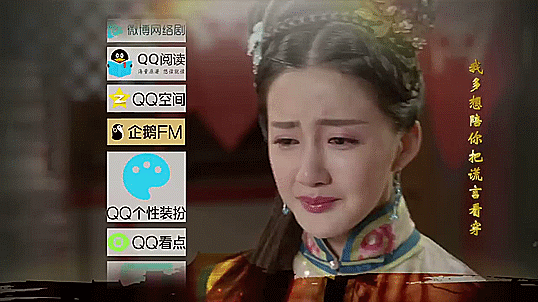

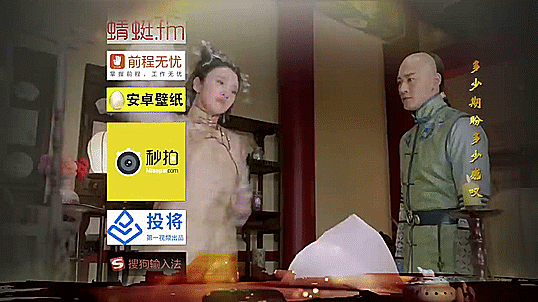


#Rule the World#独步天下#Du Bu Tian Xia#An Unrivalled World#獨步天下#Dominate The World#2017#cdrama#chinese drama#episodio 1#1st episode#youtube#Tencent Video#China Huanyu Ent. Official#YoYo English Channel#YoYo TV#Tang Yi Xin#Raymond Lam#Lam Fung#Ray Chang#Zhang Rui#Jing Gang Shan#Chen Xin Yu#Huang Si Han#Wang Kai Yi#Li Ang#Xu Rong Zhen#Wang Yuan Hui
1 note
·
View note
Text
百家姓在全球各个华语地区的拼音
中文 中國大陸 台灣 香港 澳門 新加坡 馬來西亞 越南 韩国
1 赵 Zhao Chao Chiu Chio Chow Teoh/ Chew/ Tiew Trieu Jo/Cho
2 钱 Qian Chien Chin Chin Zee Chien/Chen Tien Joen/Chun
3 孙 Sun Sun Suen Sun Soon Soon/Sun/Shun/Song Ton Son
4 李 Li Li / Lee Li / Lee Lei Lee Lee/Li Ly Lee / Rhee/ Yi
5 周 Zhou Chou Chow / Chau Chao Chew Chew / Cheu / Chou / Chow / Chiew Chu Ju/Chu
6 吴 Wu Wu Ng Ng Goh Ng / Goh / Ngo/ Ngu Ngo Oh
7 郑 Zheng Cheng Cheng Cheang Tay Ching / Tang / Tey / Tay / Tee / Teh / Cheng / Chin / Chang / Chung / Chiang Trinh
8 王 Wang Wang Wong Vong / Wong Ong / Wong Ong / Ng / Wong / Wang / Bong / Heng Vuong Wang
9 冯 Feng Feng Fung Fong Foong/Fung/Fong Phung Pung
10 陈 Chen Chen Chan Chan Tan / Chan / Ting Chan / Chin / Chen / Tan / Tang / Ting / Sin Tran Jin/Chin
11 褚 Chu Chu Chu Chu Too/Toh
12 卫 Wei Wei Wai Wai Wee/Wei Vi Ui/Oui
13 蒋 Jiang Chiang Cheung Cheong Chiang/Cheong/Chiong Tuong Jang/Chang
14 沈 Shen Shen Shum / Sum Sam Sim Sim/Shim/Shun/Shum Sim
15 韩 Han Han Hon Hon Hon/Hong Han Han
16 杨 Yang Yang Yeung Ieong Yeo / Yong Yong / Yeo / Yeoh / Eow / Yeong / Yew Duong Yang
17 朱 Zhu Chu Chu Chu Choo Chu/Choo/Jee/Jeh Chau Chu/ Joo
18 秦 Qin Chin Chun Chin/Ch'ng Tan Jin/Chin
19 尤 You Yu Yau Iao Yew/You Vuu
20 许 Xu Hsu Hui Hoi Hee / Koh Khu / Khoo / Khor / Khow / Hoo / Hooi / Khaw / Hii Hu Heo/Huh
21 何 He Ho Ho Ho Hoh Ho/Hoh/Hor Ha Ha
22 吕 Lu Lu Lui Loi Loh/Lei/Lui/Lee La/Lu Yeo/Ryeo
23 施 Shi Shih Sze Si See/Sii/Sih
24 张 Zhang Chang Cheung Cheong Cheong Cheong / Chong / Teo / Chang / Teoh / Tiong Truong Jang/Chang
25 孔 Kong Kung Hung Hong Kong/Khong/Kung Khong Gong/Kong
26 曹 Cao Tsao Cho / Tso Chou Cheng/Choo/Cho/Chu/Chao Tao Cho/Jo
27 严 Yan Yen Yim Im Yam/Ngim Nghiem Im
28 华 Hua Hua Wa / Wah Wa Hoa Wha/Wah/Wa
29 金 Jin Chin Kam Kam Kim/King Kim Kim
30 魏 Wei Wei Ngai Ngai Ngui/Gui/Woi Nguy Ui/Oui
31 陶 Tao Tao To Tou Tho/To/Too/Toh Dao Do/To
32 姜 Jiang Chiang Keung Keong Khiang/Kiang Giang Kang/Gang
33 戚 Qi Chi Chik Chek Cheok
34 谢 Xie Hsieh Tse Che Cheah / Tay / Chia Cheah / Chiah / Chia / Seah / Sia / See Ta Sa
35 邹 Zou Tsou Chau / Chow Chao Chew/Chou/Chu
36 喻 Yu Yu Yu U Yu/Yho/Yuh You/Yu
37 柏 Bai Pai Pak Pak
38 水 Shui Shui Sui Soi Shu/Tshui
39 窦 Dou Tou Tau Tao
40 章 Zhang Chang Cheung Cheong Cheong/Chong/Teo/Tiong/Tong
[编辑] 百家姓41-80
中文 中國大陸 台灣 香港 澳門 新加坡 馬來西亞 越南 韩国
41 云 Yun Yun Wan Wan Woon/Wun/Yun/Yung
42 苏 Su Su So Sou Soh Soh / Saw / Soo To
43 潘 Pan Pan Poon / Pun Pun Phua Phua / Pan / Pang / Phang Phan Ban
44 葛 Ge Ko Kot Gal
45 奚 Xi Hsi Hai Kai Hae
46 范 Fan Fan Fan Fan Fung / Fam / Fang / Hwang Pham Bum
47 彭 Peng Peng Pang Pang Pang Peng/Pang/Phang Paeng
48 郎 Lang Lang Long Long Lang
49 鲁 Lu Lu Lo Lou Loo Loo/Loh/Lu Noh
50 韦 Wei Wei Wai Wai Wai/Wei/Vei Vi
51 昌 Chang Chang Cheung Cheong Cheong/Chang/Cang Xuong
52 马 Ma Ma Ma Ma Beh / Mah / Mha / Ma Ma Ma
53 苗 Miao Miao Miu Mio
54 凤 Feng Feng Fung Fong Fong
55 花 Hua Hua Fa Fa Faa/Fah/Fha Hoa
56 方 Fang Fang Fong Fong Pung / Fang / Fong / Phun / Huong Phuong Bang
57 俞 Yu Yu Yu U Je / Yii You/Yu
58 任 Ren Jen Yam Iam Yam/Ngam/Yim/Ngieng/Ngiam Nham Rim/Yim
59 袁 Yuan Yuan Yuen Un / Iun Yuan / Yuen / Ngen Vien Won
60 柳 Liu Liu Lau Lao Liew/Liu/Lew Lieu You/Yu/Ryu
61 酆 Feng Feng Fung Fong
62 鮑 Bao Pao Pau Pao
63 史 Shi Shih Sze Si Sa
64 唐 Tang Tang Tong Tong Thang / Thong / Tang / Tong / Thong Duong
65 費讀「秘」 Pei Pei Pei Pai
66 廉 Lian Lien Lim Lim
67 岑 Cen Tsen Sum / Shum Sam Sim
68 薛 Xue Hsueh Sit Sit Sik / Sit / Silk Seol/Sul
69 雷 Lei Lei Lui Loi Lui / Looi / Lewe / Lei
70 賀 He Ho Ho Ho Hor/Hoo
71 倪 Ni Ni Ngai Ngai Geh / Nga / Ngam
72 湯 Tang Tang Tong Tong Thong / Tang / Thang
73 滕 Teng Teng Tang Tang Thang
74 殷 Yin Yin Yan Ian Yam / Ngam
75 罗 Luo Lo Law / Lo Lo Lo / Lau / Low / Loh La Rah/Na
76 毕 Bi Pi But Pat Tat
77 郝 Hao Hao Kok
78 邬 Wu Wu Wu Vu / Wu Woo / Voo / Woh / Wu / Vu O
79 安 An An On On An An / Ahn
80 常 Chang Chang Sheung Seong
[编辑] 百家姓81-120
中文 中國大陸 台灣 香港 澳門 新加坡 馬來西亞 越南 韩国
81 乐 讀「洛」或「惡」 Yue Yueh Lok/ Ok Lok/ Ok
82 于 Yu Yu Yu U
83 时 Shi Shih See / Sze Si
84 傅 Fu Fu Foo Fu Fu/Foo/Foh
85 皮 Pi Pi Pei Pei
86 卞 Bian Pien Pin Pin Byun
87 齐 Qi Chi Chai Chai
88 康 Kang Kang Hong Hong Gang/Kang
89 伍 Wu Wu Ng Ng Ng Ng/Ngo/Ngoh/Wu/Wuh/Woo
90 余 Yu Yu Yu U Yee/Tsia/Tse
91 元 Yuan Yuan Yuen Un / Iun
92 卜 Bu Pu Puk Pok/Puu
93 顾 Gu Ku Koo Ku Koe
94 孟 Meng Meng Mang Mang Mang/Meng Maeng
95 平 Ping Ping Ping Peng
96 黄 Huang Huang Wong Vong / Wong Bong / Boong / Ng / Ong / Ooi / Wong / Wee Hwang
97 和 He Ho Wo Vo Hoo/Woh/Woo/Wo Hwa
98 穆 Mu Mu Muk
99 萧 Xiao Hsiao Shiu / Siu Sio Seow/Siew/Siau/Siaw/Sew/Siu/Seu
100 尹 Yin Yin Wan Wan Yoon
101 姚 Yao Yao Yiu Io Yeo Yeo / Yeoh / Yew / Yow
102 邵 Shao Shao Siu / Shiu Sio Shaw Shao/Shaw/Sao/Shau
103 湛 Zhan Chan Cham
104 汪 Wang Wang Wong Vong / Wong Wang/Wong/Vang
105 祁 Qi Chi Kei
106 毛 Mao Mao Mo Mou Bo / Boo / Moh / Moo Mo
107 禹 Yu Yu Yu U
108 狄 Di Ti Tik / Dick Tek
109 米 Mi Mi Mai Mai
110 贝 Bei Pei Pui Pui
111 明 Ming Ming Ming Meng Myeong /Myung
112 臧 Zang Tsang Chong
113 计 Ji Chi Kai Kai
114 伏 Fu Fu Fuk Fok
115 成 Cheng Cheng Shing / Sing Seng Sang/Shang//Tshan/Tshang Sung/ Seong
116 戴 Dai Tai Tai Tai Tai/Thai/Dai/Dhai
117 谈 Tan Tan Tam Tam
118 宋 Song Sung Sung Song Song Shong/Song/Sung Song
119 茅 Mao Mao Mau Mao
120 庞 Pang Pang Pong Pong Phong/Pong/Pang
2 notes
·
View notes
Text
FMP
Dai Pai Dong - Projects
Collage
unique combination of iconic Dai Pai Dong landscapes mixed with traditional Hong Kong neon lights and patterns
really cool collage
inspired by the patterns and elements
not the vibe i'm personally going for

Exhibition Campaign
poster design for an exhibition about Dai Pai Dongs
really interesting use of type
combination of Chinese and english looks really cool
photography stands out a lot

photography


Typeface
unique typeface inspired by iconic plastic chairs that can be found in Dai Pai Dongs
super unique and interesting outcome - really inspired by this
not what I'm looking to achieve but still really cool

Fung, C. (2017). Hong Kong Dai Pai Dong. [online] Behance. Available at: https://www.behance.net/gallery/58887911/Hong-Kong-Dai-Pai-Dong?tracking_source=search_projects|dai+pai+dong&l=36 [Accessed 1 Mar. 2024].
Sit, C. (2017). Dai pai dong in Hong Kong. [online] Behance. Available at: https://www.behance.net/gallery/56693555/Dai-pai-dong-in-Hong-Kong?tracking_source=search_projects|dai+pai+dong&l=38 [Accessed 1 Mar. 2024].
su, botao (2019). Dai Pai Dong 2. [online] Behance. Available at: https://www.behance.net/gallery/80141629/Dai-Pai-Dong-2?tracking_source=search_projects|dai+pai+dong&l=39 [Accessed 1 Mar. 2024].
TANG, W. (2019). DPD Bold. [online] Behance. Available at: https://www.behance.net/gallery/87697821/DPD-Bold?tracking_source=search_projects|dai+pai+dong&l=41 [Accessed 1 Mar. 2024].
0 notes
Text
rambles on armed reaction & feminism
So I just finished Armed Reaction IV (I’ve been on a slow binge-watch of the series since last August cause I love Joyce Tang) and I have some thoughts I guess. Disclaimer: This is in no way a cohesive essay or anything just pure rambles cause it’s 1am.
TWs for rape mention
Chan Sam Yuen (Joyce Tang) has always been the heart of the series even if the first female lead is always another actress in each series. In the first series she’s a complete tomboy, and the series is trying to have a feminist message and empower women. She was the first female cop in HK to fire a gun and gun-toting female cops/female cops in general were scarce so it was a big deal. To be honest I’ve never been really into the whole Sam Yuen/Ching Fung relationship from the start (even Joyce/Marco🤮 stuff irl aside).

Anyways, Ching Fung (Marco Ngai) literally admits to being a misogynist and discriminates women based on their gender which is just... a red flag. The show wanted a nice enemies to lovers arc and sure their relationship is portrayed as cute sometimes but they sure go through a lot of shit. Even before the main messed up cheating arc with Wing (Angie Cheong) he gets drunk and hooks up with some girl in the first series too.

I feel like the first series has a lot of these little feminist moments, where Sam Yuen is adamant that women can do anything men can do. Her character is contrasted with Yu Sau Ngo (Esther Kwan) who, at the start of the series, is a housewife who works a deskjob cause it’s more acceptable for women. She prioritizes her kid and her husband, but in the end her husband leaves her. I didn’t really like Bobby Au-Yeung’s character Siu Sang either. I’m glad Chi (Ada Choi)’s character actually broke up with him cause I don’t think I’d forgive a man if he switched out my birth control to try getting me pregnant like... red flag.

Anyways, then as the series progresses and she becomes a mother, and starts to prioritize her family over work which I guess is normal and happens to women irl. It just felt like her character started changing too much and didn’t feel like the original feminist her from the first series. I suppose people change, and they wanted to show character development, like the tomboy in her early 20s can become a good wife/mother etc. I was kinda iffy on that, I don’t think she should’ve changed too much. Or maybe it’s meant to show that women can lean into “traditional” female roles and still be strong feminists or whatever idk. Then I noticed in 2021 series, they bring back the feminist quotes from Sam Yuen. She challenges Moses Chan’s character a lot, saying things about strong women, and telling him not to assume certain misogynistic stereotypes about women. I think it’s a little on the nose and trying to get the audience to remember the first series like ‘Hey remember her?? The strong female character?’

Now let’s get into her experiences. Chan Sam Yuen is notorious for being one of if not TVB’s most tragic characters. Father already dead, violently raped, ptsd and other trauma, son killed, daughter kidnapped, nearly died giving birth to her second son, husband killed, etc... like... can she please have a break??? What was the reason for all this... Did the show keep throwing curveballs at her to prove how strong she is despite all that? Why does she have to suffer so much? Is it like those horror movies where she’s being punished for being a feminist? But ironically, it’s the things associated with traditional femininity like motherhood/being a wife where she gets hurt the most, like she loses her children and husband. Is this supposed to mean anything or am I reading too much into it??

The ending of series 4 was kind of an open ending (well until the 2021 series came), and was supposed to be hopeful. (And another TVB BBQ finale) Sam Yuen spends the rest of her life being optimistic that maybe one day, her husband will return. Maybe he’s alive out there. This is very similar to Joyce’s other notable character Hung Sheung Sin from Come Home Love: Lo and Behold who also spends 20 years yearning for a husband to come back. I feel like with all the grief Sam Yuen endures, it could’ve been explored a lot more. I mean, there were 40 episodes in Series 4! Dragged on way too long on things that I didn’t particularly care about if you ask me, and a lot of the Bobby/Ada stuff was like an exact rehash of the Bobby/Esther stuff in earlier series (he gets the girl, he doesn’t get the girl, etc.) Then in Armed Reaction 2021 she finally gets some closure and learns to move on and finally accept that her husband is gone. Very emotional, well acted, and the best part of the reboot.


I feel that at the core of the series, the strongest points have always been the female friendships between Sam Yuen and the other female lead, whether it is Esther Kwan or Ada Choi’s characters. TBH They should’ve just been gay together They have always been supportive of each other throughout, which I appreciate.
BONUS:

Not even getting into the queer-coding discussion rn but bonus points for Sam Yuen saying she doesn’t discriminate gay people klsdjflsd.

And bonus points for Cherry (Mandy Lam) showing up in Armed Reaction IV. I didn’t expect her to be in so many episodes and have a whole plot based around her being forced to drug-deal. I thought she would only be in 1 episode so I’m pleasantly surprised <3 Love her and wish she could’ve interacted with Sam Yuen.
1 note
·
View note